#Bishopsgate Goods Station
Explore tagged Tumblr posts
Text
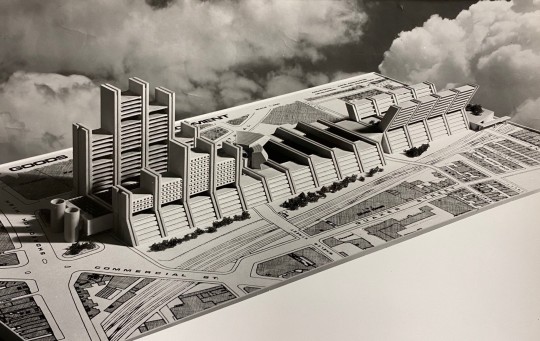
Thorp Design | Propuesta para el Bishopsgate Goods Station | Londres, Reino Unido | 1972
74 notes
·
View notes
Text
Good Omens London Trip 🐍💞🪽
It's my Birthday today and I treated myself to a trip to London last weekend to see my favourite actor Michael Sheen in Nye at the National Theatre. I made the most of my weekend by combining it with a Good Omens filming location self-tour and I'd love to share it with you all. So, are you ready for the tour?
Here we go!
Starting off with Soho, and the inspiration for Whickber Street, where Aziraphale's bookshop, Give Me Coffee or Give Me Death, The Small Back Room, and the Dirty Donkey are located.
It’s Berwick Street and a record shop that is very similar in shape to A.Z Fell & Co. Bonus points for spotting Duck Lane!
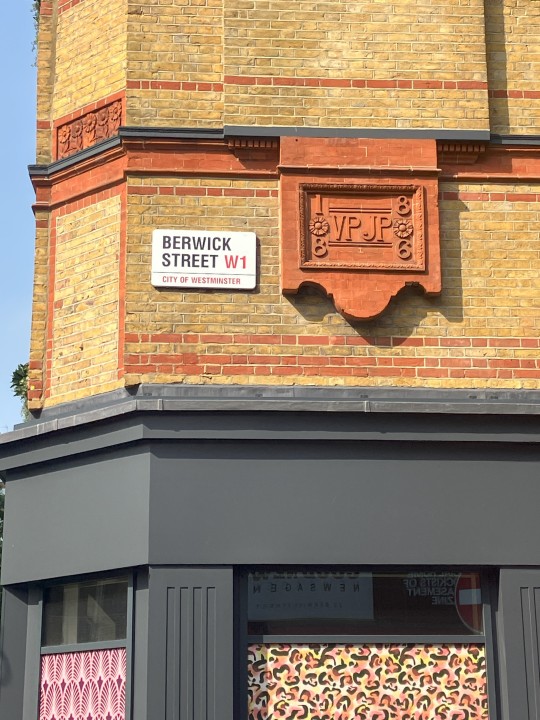
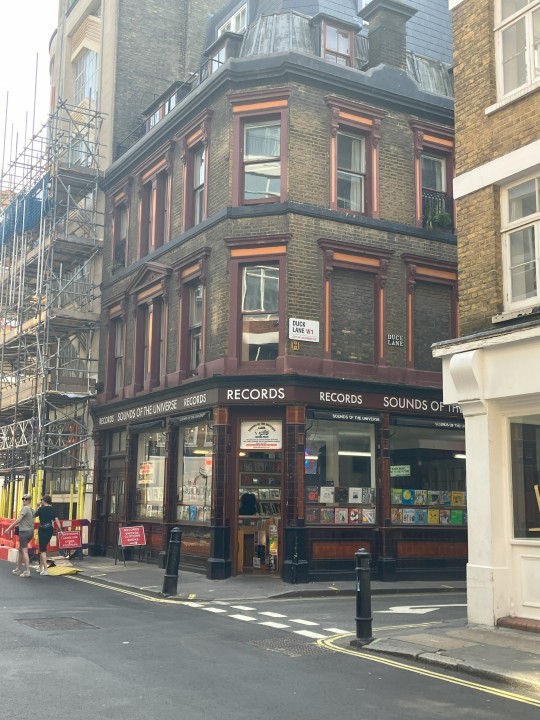
Next is Berkeley Square, a short walk from Soho. The first two photos are of the real Berkeley Square gardens in Mayfair, and the last two photos were taken in the filming location of Tavistock Square across the other side of central London near Kings Cross. I’m sitting on their ‘body swap’ bench in the last photo!
As you can see, the benches are turned around facing inwards now but are the other way, facing outwards in Good Omens.
Oh, and I can confirm that there were no nightingales singing in either location 😭
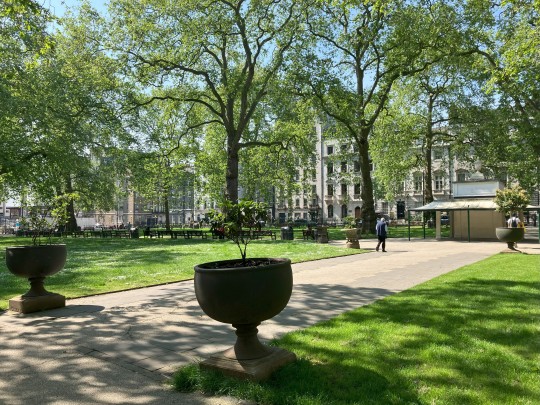
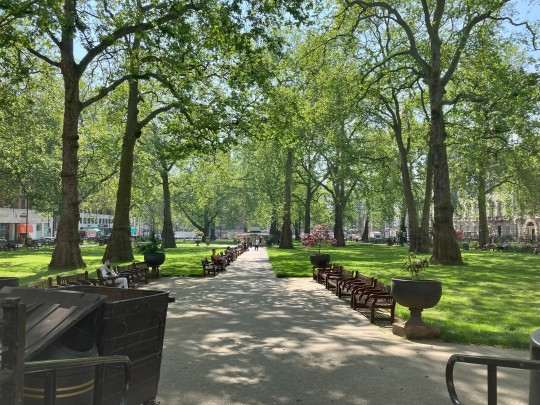
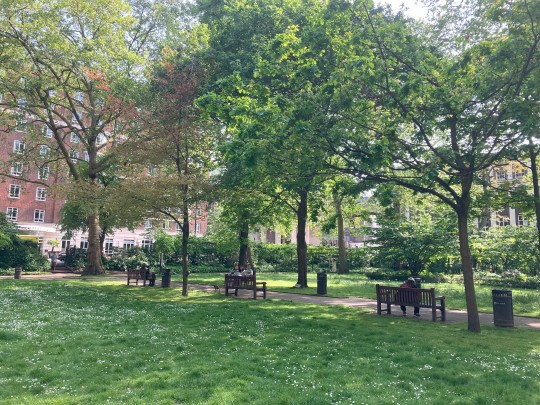
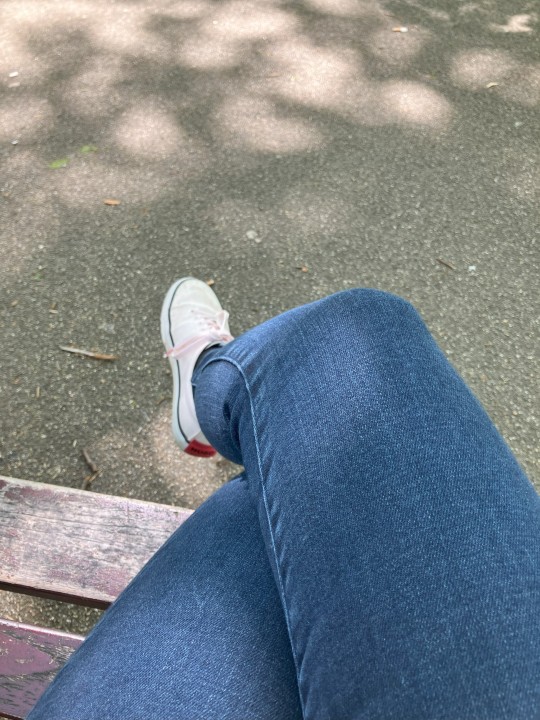
Heading up the road a few minutes from Tavistock Square to The Enterprise pub where I met a fellow fan who kindly took photos of me posing (I bet the staff thought we were off our rockers!). This is where Crowley drowns his sorrows in Talisker Whisky whilst waiting for the world to end after thinking he'd lost Aziraphale. Omg that poor poor demon, he was really just gonna die along with the world.
Also, one of my favourite moments of season 1 is Crolwey's line: "I heard that. It was the wiggle-on..." then shrugs. 😆 So many emotions in such short a time.

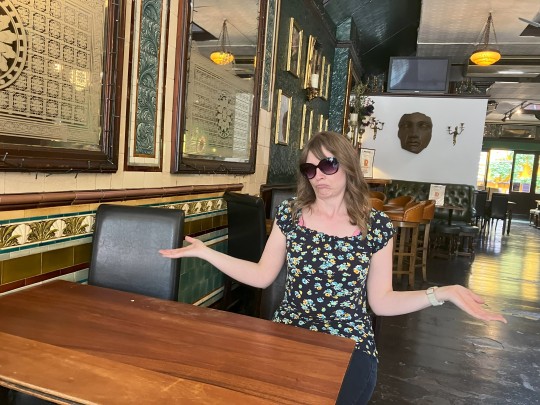
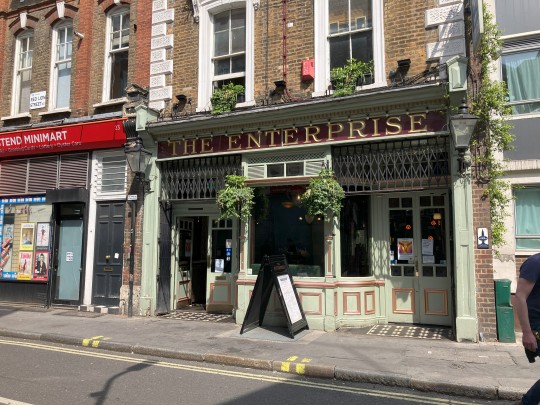
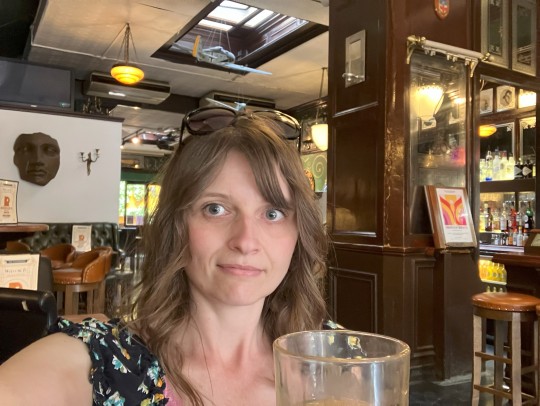
Onto the Ritz. The first two photos are of the real Ritz (a stone's throw from Berkeley Square) and the last one is inside Masala Zone in Piccadilly Circus where the ‘Quite extraordinary amounts of alcohol’ and ‘To the World’ scenes were filmed.
I ate in here alone to get the photo and was so lucky with the table I was given! Perfect discreet snap whilst eating my curry! Haha!
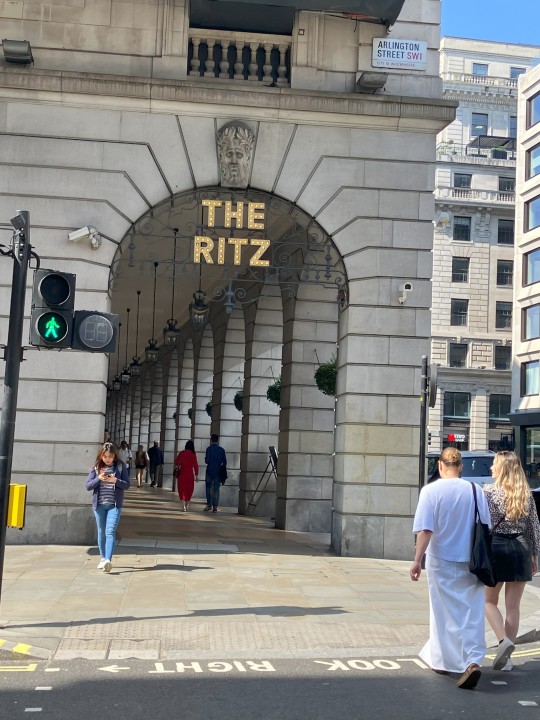
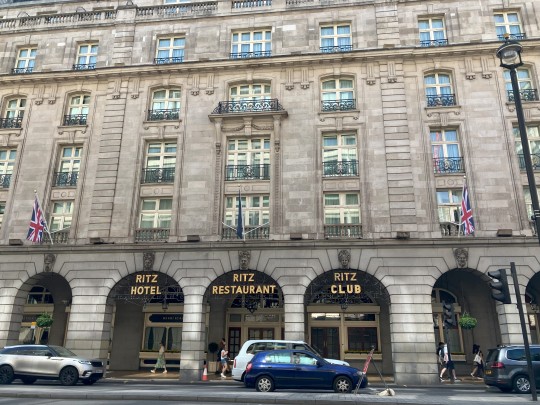
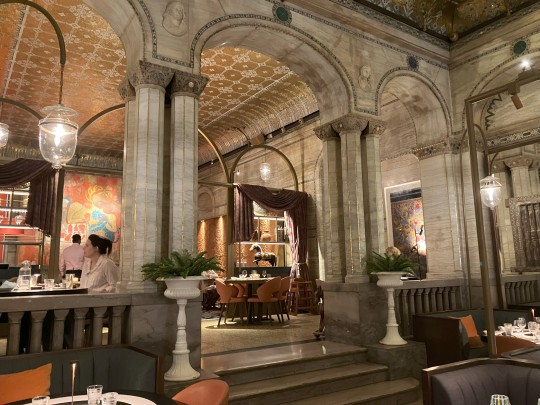
Next up is Battersea Park and the Bandstand. It was a bit of a faff to get there, it's an 8-minute walk from the Battersea Power Station underground and we walked the full length of the park to find the Bandstand, but it was so worth it.
Also filmed here was Gabriel and Aziraphale’s run/jog. Poor Angel is soft scene.
The trees were a little leafier with it being mid-May and the park was very busy because the weather was glorious. They also have a beautiful lake here with herons!

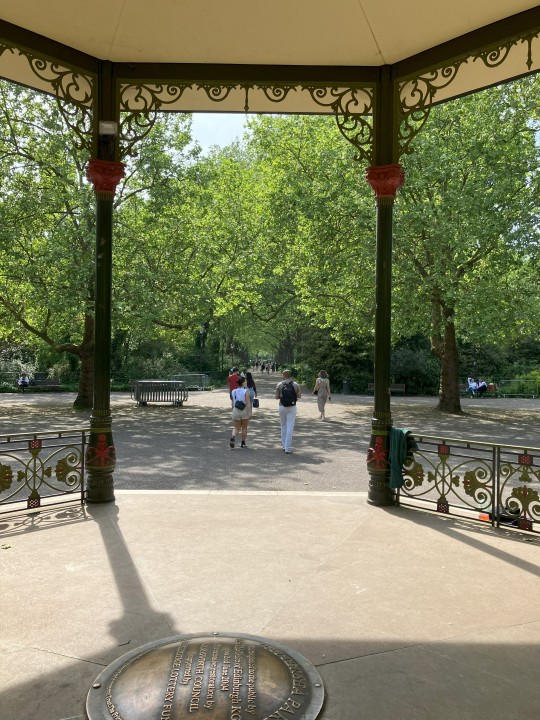
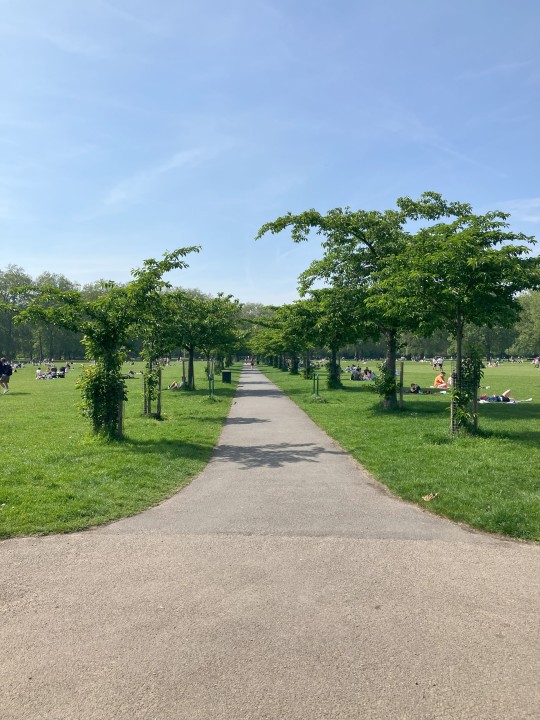
The Heaven & Hell staircase escalators are right over the east side of London in Broadgate Tower, Bishopsgate. I got the overground to Liverpool Street station to get there. It is in a private business building so I politely/awkwardly asked the receptionist if I could take a photo and had to explain about the scene from Good Omens… eek! But he kindly let me snap a photo anyway! (Phew)
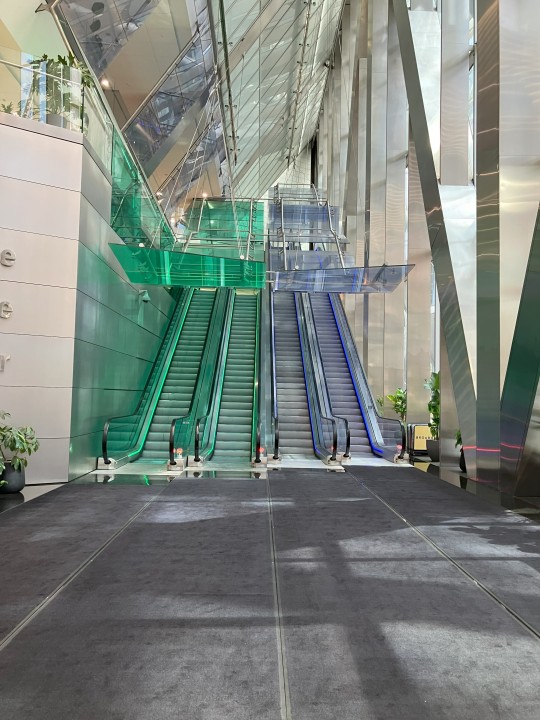
The Windmill Theatre was three minutes away from my hotel in Piccadilly Circus, so I wandered up the road to take a photo of where Aziraphale ‘performed on the West End stage’ as Fell the Marvelous. And wasn’t he just?
The scenes weren't filmed here but it was fun to find it anyway.
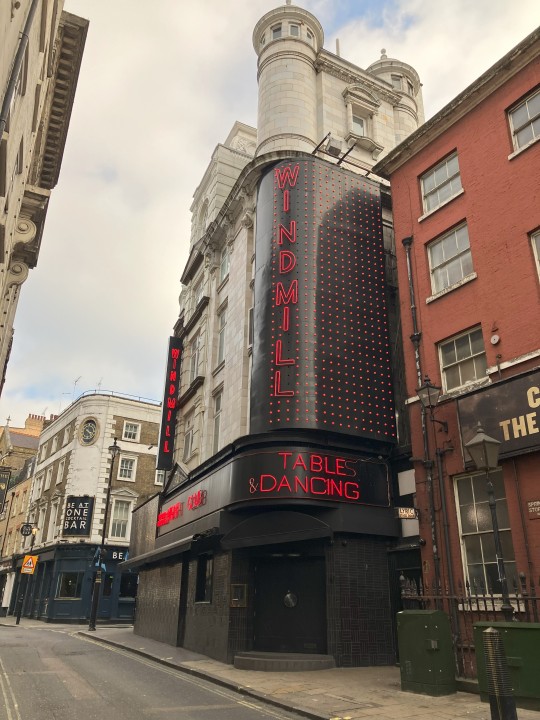
St James’s Park is up next! I sat on their bench and got my friend to take photos of me posing and had fun editing the first photo. Haha! We enjoyed walking through the park, watching the ducks on the lake and had a nosey at Buckingham Palace while we were there.
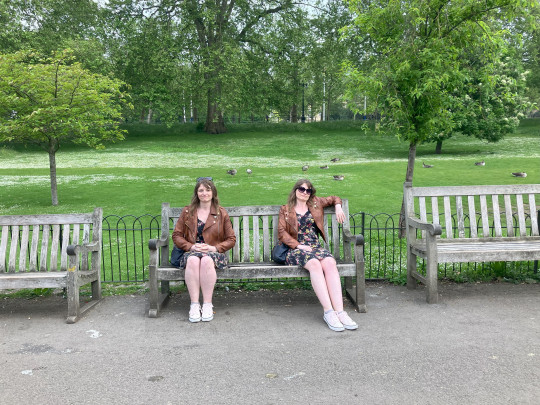
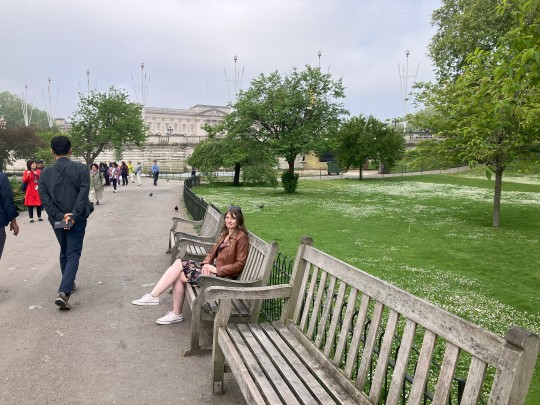
The Duke of York Statue steps are at the other end of St James's Park and were fun to walk up. I smiled to myself as I thought of the scene where Crowley says ‘Well let's have lunch? Hmm,’ and Aziraphale turns around, as it was the first time I realised that these two were more than just friends.
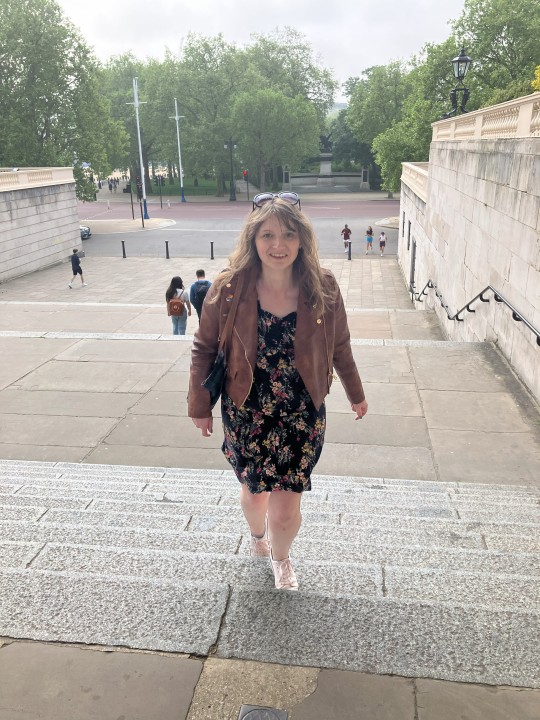
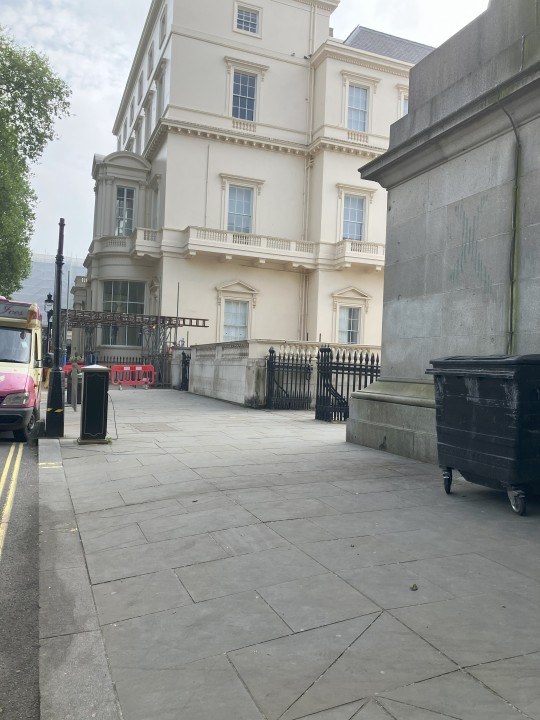
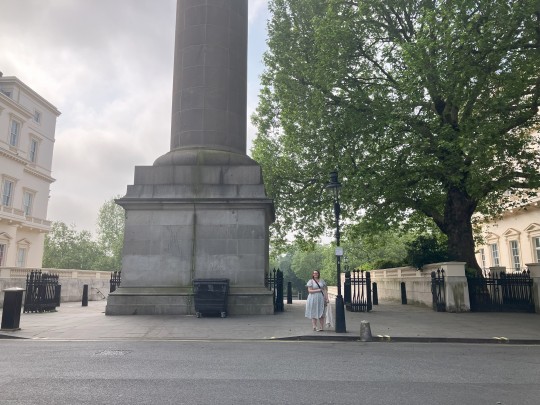
Heaven’s top floor, the Sky Garden in Fenchurch Street near Monument is a very tall building with a botanical garden on the top floor. You can visit the sky garden for free, but you do need to book in advance so it’s best to plan ahead for this one. The views of London are breathtaking from the 35th floor and the tropical plants are fun.
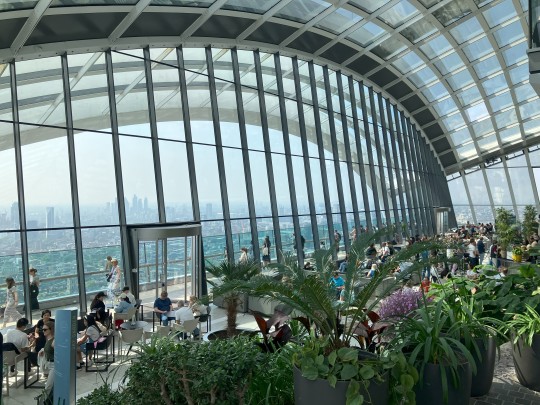
My last stop for this visit was Shakespeare’s Globe Theatre. I booked a tour on the morning I was due to go home. The first tour is 10 am and lasts an hour, so I dashed off as soon as the tour guide was uttering his last words about the gift shop, across London back to Kings Cross to pick up my suitcase from luggage storage and get the 11:48 am train home!
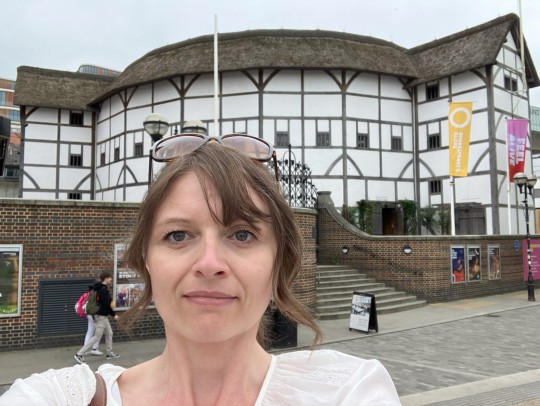
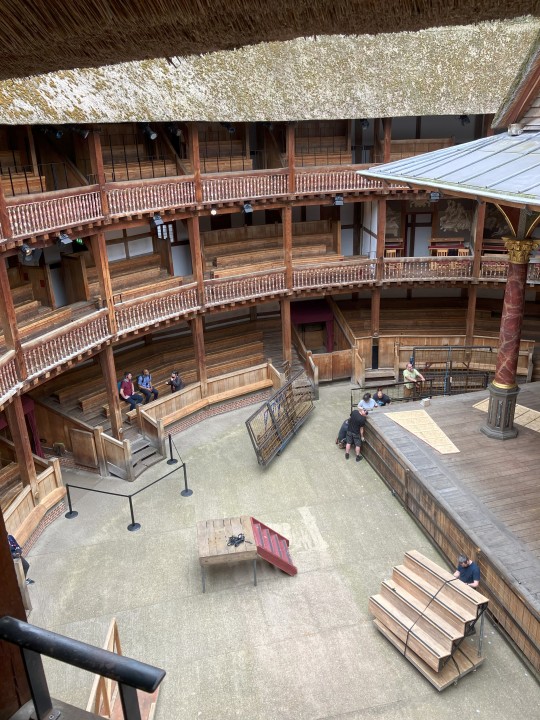
One I missed and could have easily gone to is St Margaret Street where Newton and Shadwell meet, and Shadwell fleeces Newton for a cup of tea with nine sugars and pockets the change. A bit gutted I missed it to be honest – I love Jack Whitehall (I’m back in London with the family in June so I’ll swing by and update then!)
There are also some other locations a little further afield that I might try to visit on a later date, such as Shadwell's and Madam Tracy's flat down Hornsey Road in Islington, Crowley's Flat exterior in Eastfields Avenue, Best Cafe on Garratt Lane where Crowley meets Shadwell, Crystal Palace Dinosaur Park where the ineffable husbands watch Warlock defacing a dinosaur sign and Antonella's Cafe and Bistro where Crowley and Aziraphale are thinking of ideas to track down the antichrist whist Aziraphale eats cake.
Okay, I’m gonna finish up with the man himself. The very kind, very charming, and VERY patient Michael Sheen The reason for my London visit in the first place. Nye was spectacular OBviOUsLy, but he was super generous with his time at stage door for us all. I got a hug and asked him to pass it on to Aziraphale (that angel really needs a hug) and it made him laugh, which made my night!
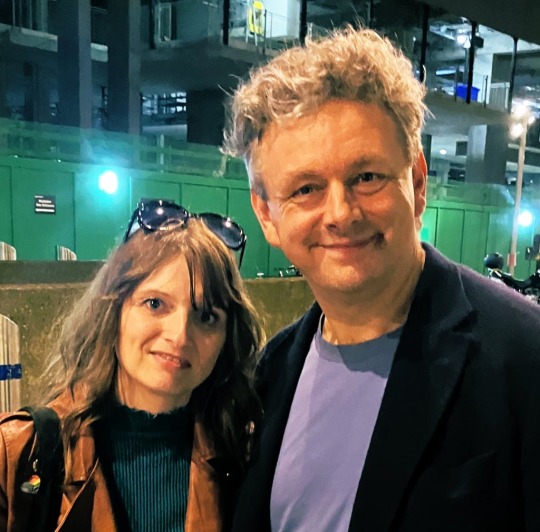
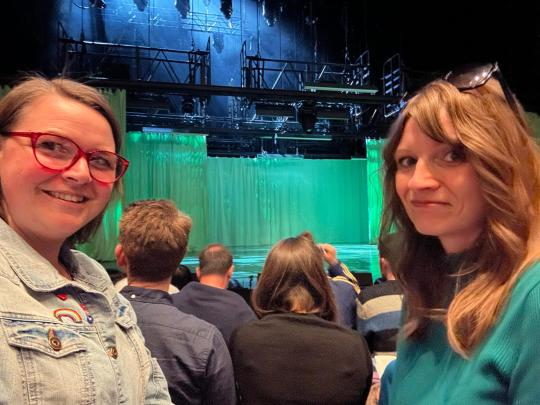

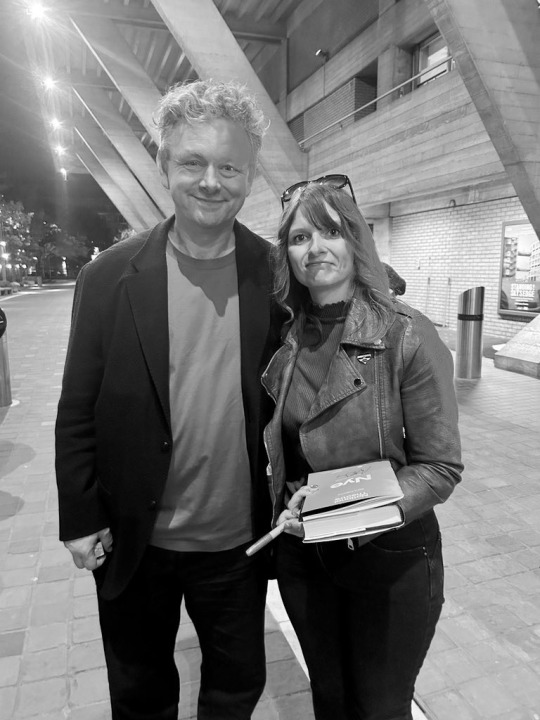
Check out my reblog for extra locations when I visited London again a month later, and for a hilarious bonus photo of.... Gabriel??!
Here’s the wonderful map I used -
from this website:
#good omens#good omens filming locations#good omens london#good omens tour#ineffable husbands#aziracrow#crowley#aziraphale#neil gaiman#michael sheen#david tennant#good omens locations#nye#Shakespeare globe#battersea park#st james's park#the ritz#Berkeley square#soho#mayfair#sky garden#windmill theatre#good omens travel
123 notes
·
View notes
Text
220520 • 1:23pm 🏙
Touring Nairn’s City of London: northern and western edges. I seized a sunny day to go see some of Ian Nairn’s destinations and more.
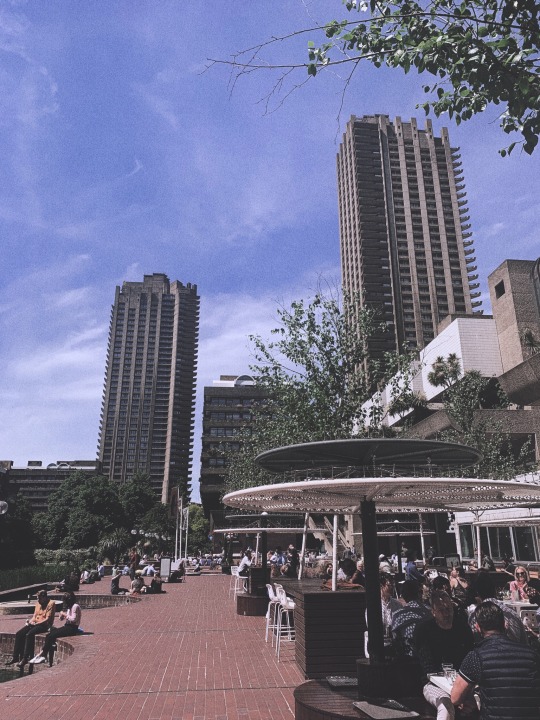
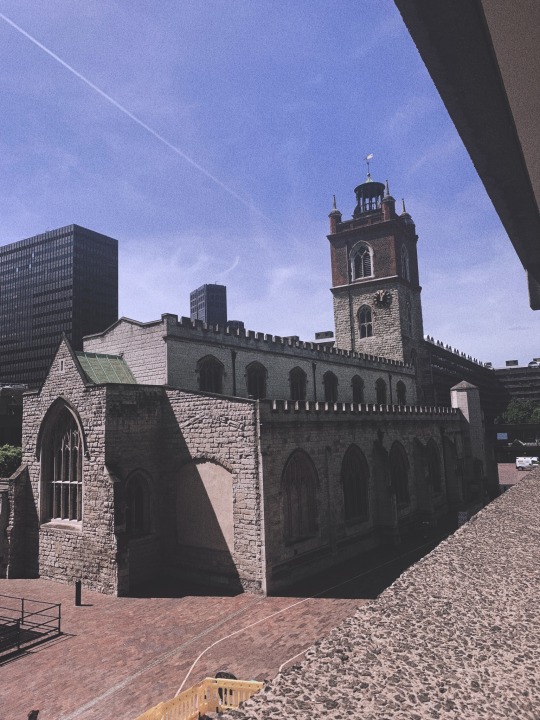
The Barbican is a good first stop, a lovely bit of City Brutalism (though maze-like). I find Brutalist buildings so attractive when complemented by sunshine. Enjoyed visiting the book fair at St Giles-without-Cripplegate! Wonderful prices and selection with new stock coming in, plus it’s in a sweet little church.
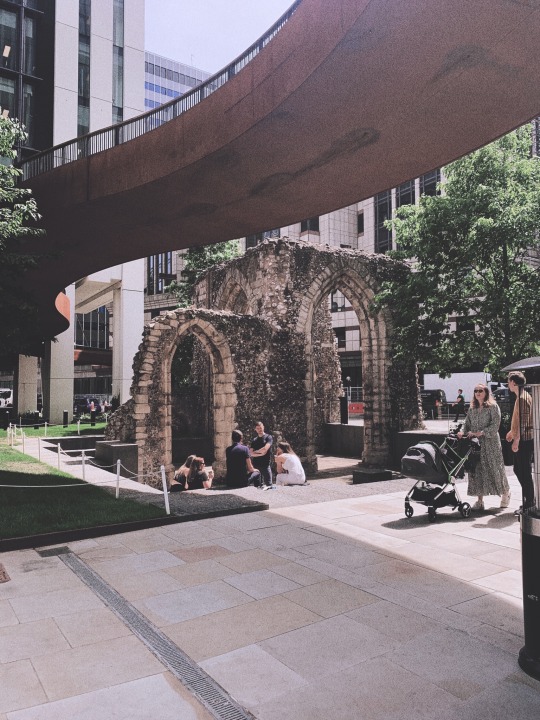
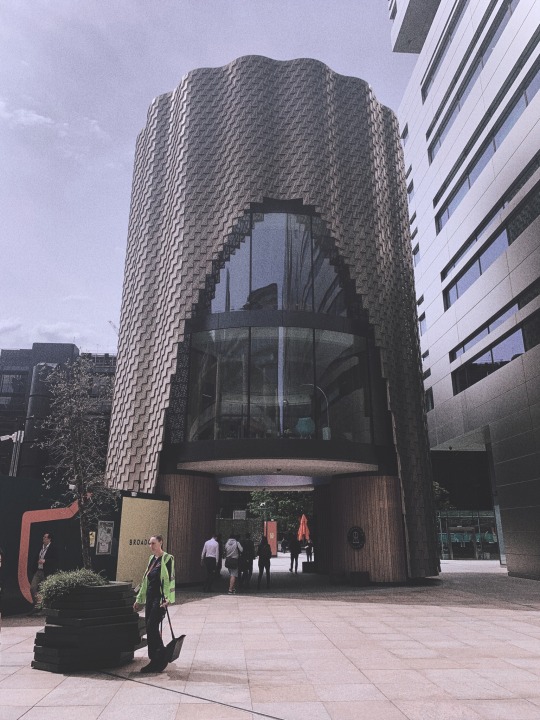
Depending on how you leave the Barbican, you may come across St Alphege London Wall. I’m quite fond of ruins - there is a wistful charm to the fragmented identity of what once was. Broadgate has an amusing (and inadvertent?) modern homage to St Alphege.
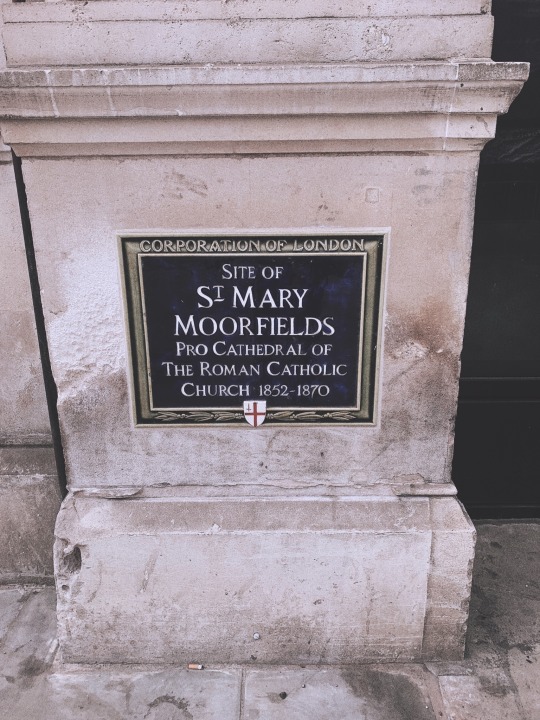
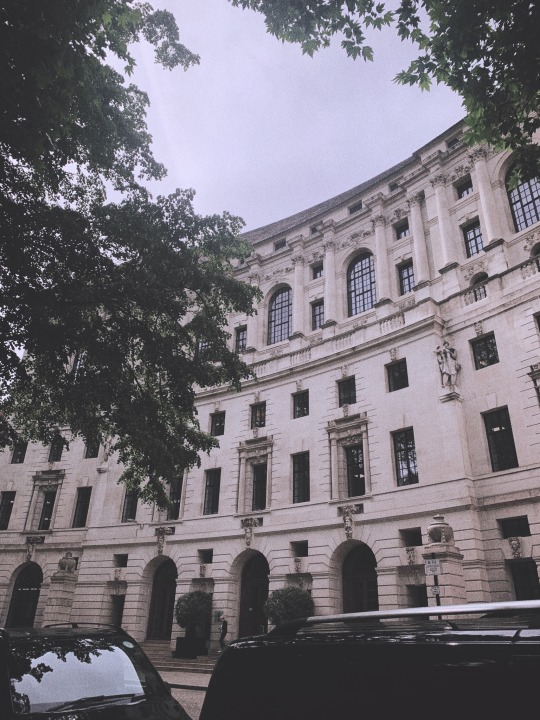
Following Nairn, we head to Finsbury Circus for Lutyens’ Britannic House. Coming from Broadgate, the keen eye might notice a commemoration plaque for the old St Mary Moorfields. I’ve probably seen Lutyens around, but this is the first time I’ve consciously visited one of his works; don’t know much about him but the statues and classical details were charming.
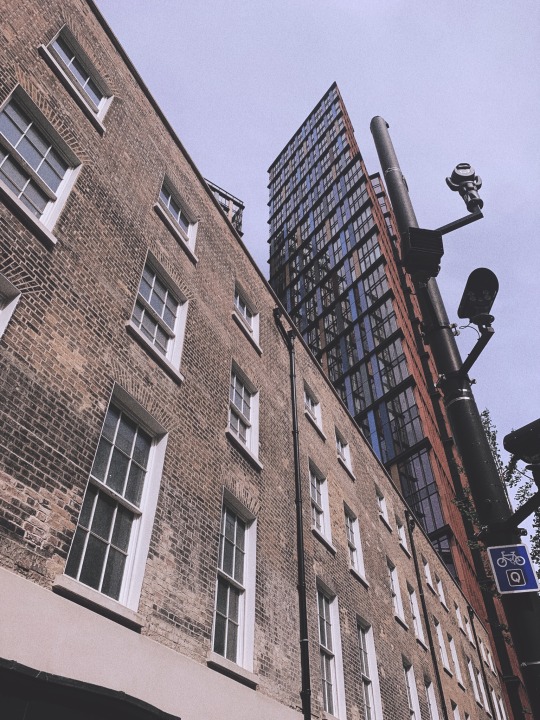
We now come to a blooper in my tour. When I mapped out Nairn’s route, I erroneously put down Sun Street rather than Sun St Passage. Nevertheless, it is fascinating to walk down; you fancy the yellow bricks quiver in the face of One Crown Pl.
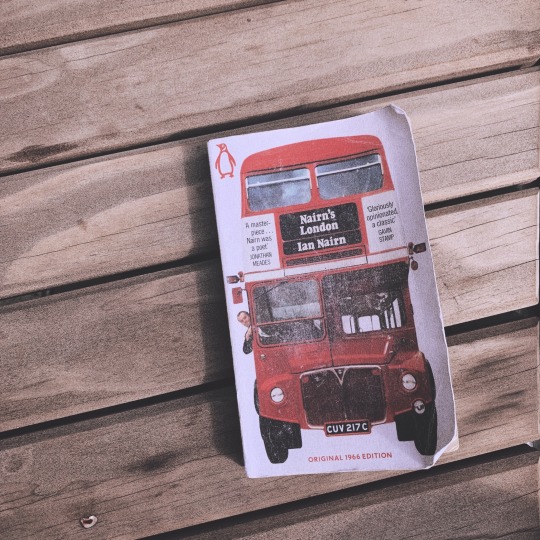
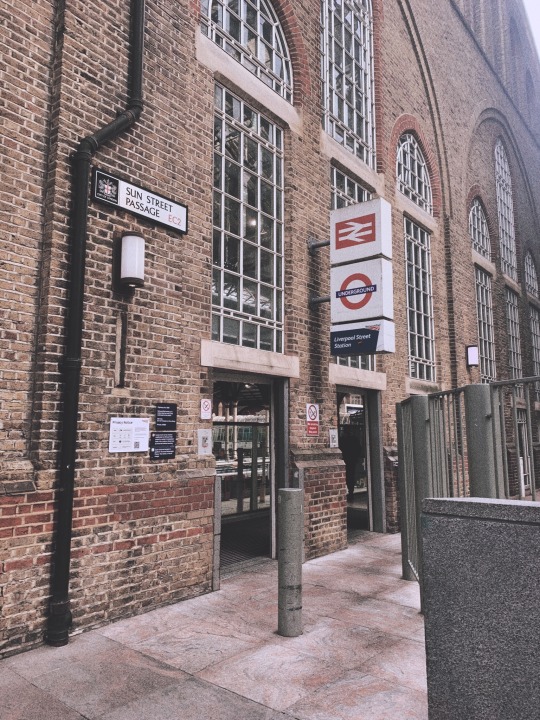
Exchange Square is a good place to stop and spend a sunny afternoon in. From there, the actual destination of Sun St Passage leads to Liverpool St station. Bit disappointed when I couldn’t find the peek at Hawksmoor’s Christ Church as Nairn described - a consequence of the City’s endless expansion perhaps? The City bleeds further into its surroundings, melting old boundaries with its ever increasing strength of commerce. Is it for better or worse? Maybe only time will tell. Those clusters of glass towers certainly feel a little menacing sometimes.
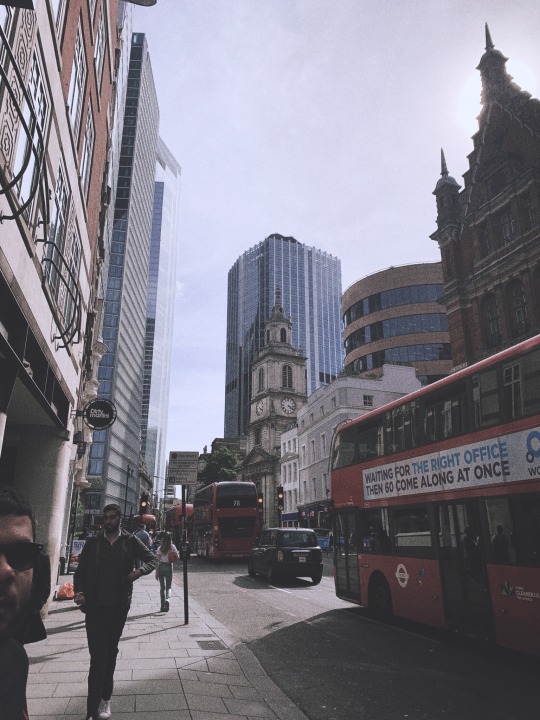
As I caught my bus, a view of St Botolph-without-Bishopsgate concludes the trip. It’s one of the 3 St Botolphs in the area; there’s also Aldgate and Aldersgate. Whew! Church names amirite. (City church tour eventually, I promise.)
☞ studygram
#studyblr#studyblr community#archiblr#architecture studyblr#architecture student#bookblr#dark academia#dark academia aesthetic#light academia#light academia aesthetic#writing#venetianwindow#heyzainab#studyvan#astudentslifebuoy#huitingreads#myhoneststudyblr#nihaohoney#heysantiago#heypeachblossom#architectingly#tusermelissa#problematicprocrastinator
26 notes
·
View notes
Text
XVI. THE EXODUS FROM LONDON.
So you understand the roaring wave of fear that swept through the greatest city in the world just as Monday was dawning—the stream of flight rising swiftly to a torrent, lashing in a foaming tumult round the railway stations, banked up into a horrible struggle about the shipping in the Thames, and hurrying by every available channel northward and eastward. By ten o’clock the police organisation, and by midday even the railway organisations, were losing coherency, losing shape and efficiency, guttering, softening, running at last in that swift liquefaction of the social body.
All the railway lines north of the Thames and the South-Eastern people at Cannon Street had been warned by midnight on Sunday, and trains were being filled. People were fighting savagely for standing-room in the carriages even at two o’clock. By three, people were being trampled and crushed even in Bishopsgate Street, a couple of hundred yards or more from Liverpool Street station; revolvers were fired, people stabbed, and the policemen who had been sent to direct the traffic, exhausted and infuriated, were breaking the heads of the people they were called out to protect.
And as the day advanced and the engine drivers and stokers refused to return to London, the pressure of the flight drove the people in an ever-thickening multitude away from the stations and along the northward-running roads. By midday a Martian had been seen at Barnes, and a cloud of slowly sinking black vapour drove along the Thames and across the flats of Lambeth, cutting off all escape over the bridges in its sluggish advance. Another bank drove over Ealing, and surrounded a little island of survivors on Castle Hill, alive, but unable to escape.
After a fruitless struggle to get aboard a North-Western train at Chalk Farm—the engines of the trains that had loaded in the goods yard there ploughed through shrieking people, and a dozen stalwart men fought to keep the crowd from crushing the driver against his furnace—my brother emerged upon the Chalk Farm road, dodged across through a hurrying swarm of vehicles, and had the luck to be foremost in the sack of a cycle shop. The front tire of the machine he got was punctured in dragging it through the window, but he got up and off, notwithstanding, with no further injury than a cut wrist. The steep foot of Haverstock Hill was impassable owing to several overturned horses, and my brother struck into Belsize Road.
So he got out of the fury of the panic, and, skirting the Edgware Road, reached Edgware about seven, fasting and wearied, but well ahead of the crowd. Along the road people were standing in the roadway, curious, wondering. He was passed by a number of cyclists, some horsemen, and two motor cars. A mile from Edgware the rim of the wheel broke, and the machine became unridable. He left it by the roadside and trudged through the village. There were shops half opened in the main street of the place, and people crowded on the pavement and in the doorways and windows, staring astonished at this extraordinary procession of fugitives that was beginning. He succeeded in getting some food at an inn.
For a time he remained in Edgware not knowing what next to do. The flying people increased in number. Many of them, like my brother, seemed inclined to loiter in the place. There was no fresh news of the invaders from Mars.
At that time the road was crowded, but as yet far from congested. Most of the fugitives at that hour were mounted on cycles, but there were soon motor cars, hansom cabs, and carriages hurrying along, and the dust hung in heavy clouds along the road to St. Albans.
It was perhaps a vague idea of making his way to Chelmsford, where some friends of his lived, that at last induced my brother to strike into a quiet lane running eastward. Presently he came upon a stile, and, crossing it, followed a footpath northeastward. He passed near several farmhouses and some little places whose names he did not learn. He saw few fugitives until, in a grass lane towards High Barnet, he happened upon two ladies who became his fellow travellers. He came upon them just in time to save them.
He heard their screams, and, hurrying round the corner, saw a couple of men struggling to drag them out of the little pony-chaise in which they had been driving, while a third with difficulty held the frightened pony’s head. One of the ladies, a short woman dressed in white, was simply screaming; the other, a dark, slender figure, slashed at the man who gripped her arm with a whip she held in her disengaged hand.
My brother immediately grasped the situation, shouted, and hurried towards the struggle. One of the men desisted and turned towards him, and my brother, realising from his antagonist’s face that a fight was unavoidable, and being an expert boxer, went into him forthwith and sent him down against the wheel of the chaise.
It was no time for pugilistic chivalry and my brother laid him quiet with a kick, and gripped the collar of the man who pulled at the slender lady’s arm. He heard the clatter of hoofs, the whip stung across his face, a third antagonist struck him between the eyes, and the man he held wrenched himself free and made off down the lane in the direction from which he had come.
Partly stunned, he found himself facing the man who had held the horse’s head, and became aware of the chaise receding from him down the lane, swaying from side to side, and with the women in it looking back. The man before him, a burly rough, tried to close, and he stopped him with a blow in the face. Then, realising that he was deserted, he dodged round and made off down the lane after the chaise, with the sturdy man close behind him, and the fugitive, who had turned now, following remotely.
Suddenly he stumbled and fell; his immediate pursuer went headlong, and he rose to his feet to find himself with a couple of antagonists again. He would have had little chance against them had not the slender lady very pluckily pulled up and returned to his help. It seems she had had a revolver all this time, but it had been under the seat when she and her companion were attacked. She fired at six yards’ distance, narrowly missing my brother. The less courageous of the robbers made off, and his companion followed him, cursing his cowardice. They both stopped in sight down the lane, where the third man lay insensible.
“Take this!” said the slender lady, and she gave my brother her revolver.
“Go back to the chaise,” said my brother, wiping the blood from his split lip.
She turned without a word—they were both panting—and they went back to where the lady in white struggled to hold back the frightened pony.
The robbers had evidently had enough of it. When my brother looked again they were retreating.
“I’ll sit here,” said my brother, “if I may”; and he got upon the empty front seat. The lady looked over her shoulder.
“Give me the reins,” she said, and laid the whip along the pony’s side. In another moment a bend in the road hid the three men from my brother’s eyes.
So, quite unexpectedly, my brother found himself, panting, with a cut mouth, a bruised jaw, and bloodstained knuckles, driving along an unknown lane with these two women.
He learned they were the wife and the younger sister of a surgeon living at Stanmore, who had come in the small hours from a dangerous case at Pinner, and heard at some railway station on his way of the Martian advance. He had hurried home, roused the women—their servant had left them two days before—packed some provisions, put his revolver under the seat—luckily for my brother—and told them to drive on to Edgware, with the idea of getting a train there. He stopped behind to tell the neighbours. He would overtake them, he said, at about half past four in the morning, and now it was nearly nine and they had seen nothing of him. They could not stop in Edgware because of the growing traffic through the place, and so they had come into this side lane.
That was the story they told my brother in fragments when presently they stopped again, nearer to New Barnet. He promised to stay with them, at least until they could determine what to do, or until the missing man arrived, and professed to be an expert shot with the revolver—a weapon strange to him—in order to give them confidence.
They made a sort of encampment by the wayside, and the pony became happy in the hedge. He told them of his own escape out of London, and all that he knew of these Martians and their ways. The sun crept higher in the sky, and after a time their talk died out and gave place to an uneasy state of anticipation. Several wayfarers came along the lane, and of these my brother gathered such news as he could. Every broken answer he had deepened his impression of the great disaster that had come on humanity, deepened his persuasion of the immediate necessity for prosecuting this flight. He urged the matter upon them.
“We have money,” said the slender woman, and hesitated.
Her eyes met my brother’s, and her hesitation ended.
“So have I,” said my brother.
She explained that they had as much as thirty pounds in gold, besides a five-pound note, and suggested that with that they might get upon a train at St. Albans or New Barnet. My brother thought that was hopeless, seeing the fury of the Londoners to crowd upon the trains, and broached his own idea of striking across Essex towards Harwich and thence escaping from the country altogether.
Mrs. Elphinstone—that was the name of the woman in white—would listen to no reasoning, and kept calling upon “George”; but her sister-in-law was astonishingly quiet and deliberate, and at last agreed to my brother’s suggestion. So, designing to cross the Great North Road, they went on towards Barnet, my brother leading the pony to save it as much as possible. As the sun crept up the sky the day became excessively hot, and under foot a thick, whitish sand grew burning and blinding, so that they travelled only very slowly. The hedges were grey with dust. And as they advanced towards Barnet a tumultuous murmuring grew stronger.
They began to meet more people. For the most part these were staring before them, murmuring indistinct questions, jaded, haggard, unclean. One man in evening dress passed them on foot, his eyes on the ground. They heard his voice, and, looking back at him, saw one hand clutched in his hair and the other beating invisible things. His paroxysm of rage over, he went on his way without once looking back.
As my brother’s party went on towards the crossroads to the south of Barnet they saw a woman approaching the road across some fields on their left, carrying a child and with two other children; and then passed a man in dirty black, with a thick stick in one hand and a small portmanteau in the other. Then round the corner of the lane, from between the villas that guarded it at its confluence with the high road, came a little cart drawn by a sweating black pony and driven by a sallow youth in a bowler hat, grey with dust. There were three girls, East End factory girls, and a couple of little children crowded in the cart.
“This’ll tike us rahnd Edgware?” asked the driver, wild-eyed, white-faced; and when my brother told him it would if he turned to the left, he whipped up at once without the formality of thanks.
My brother noticed a pale grey smoke or haze rising among the houses in front of them, and veiling the white façade of a terrace beyond the road that appeared between the backs of the villas. Mrs. Elphinstone suddenly cried out at a number of tongues of smoky red flame leaping up above the houses in front of them against the hot, blue sky. The tumultuous noise resolved itself now into the disorderly mingling of many voices, the gride of many wheels, the creaking of waggons, and the staccato of hoofs. The lane came round sharply not fifty yards from the crossroads.
“Good heavens!” cried Mrs. Elphinstone. “What is this you are driving us into?”
My brother stopped.
For the main road was a boiling stream of people, a torrent of human beings rushing northward, one pressing on another. A great bank of dust, white and luminous in the blaze of the sun, made everything within twenty feet of the ground grey and indistinct and was perpetually renewed by the hurrying feet of a dense crowd of horses and of men and women on foot, and by the wheels of vehicles of every description.
“Way!” my brother heard voices crying. “Make way!”
It was like riding into the smoke of a fire to approach the meeting point of the lane and road; the crowd roared like a fire, and the dust was hot and pungent. And, indeed, a little way up the road a villa was burning and sending rolling masses of black smoke across the road to add to the confusion.
Two men came past them. Then a dirty woman, carrying a heavy bundle and weeping. A lost retriever dog, with hanging tongue, circled dubiously round them, scared and wretched, and fled at my brother’s threat.
So much as they could see of the road Londonward between the houses to the right was a tumultuous stream of dirty, hurrying people, pent in between the villas on either side; the black heads, the crowded forms, grew into distinctness as they rushed towards the corner, hurried past, and merged their individuality again in a receding multitude that was swallowed up at last in a cloud of dust.
“Go on! Go on!” cried the voices. “Way! Way!”
One man’s hands pressed on the back of another. My brother stood at the pony’s head. Irresistibly attracted, he advanced slowly, pace by pace, down the lane.
Edgware had been a scene of confusion, Chalk Farm a riotous tumult, but this was a whole population in movement. It is hard to imagine that host. It had no character of its own. The figures poured out past the corner, and receded with their backs to the group in the lane. Along the margin came those who were on foot threatened by the wheels, stumbling in the ditches, blundering into one another.
The carts and carriages crowded close upon one another, making little way for those swifter and more impatient vehicles that darted forward every now and then when an opportunity showed itself of doing so, sending the people scattering against the fences and gates of the villas.
“Push on!” was the cry. “Push on! They are coming!”
In one cart stood a blind man in the uniform of the Salvation Army, gesticulating with his crooked fingers and bawling, “Eternity! Eternity!” His voice was hoarse and very loud so that my brother could hear him long after he was lost to sight in the dust. Some of the people who crowded in the carts whipped stupidly at their horses and quarrelled with other drivers; some sat motionless, staring at nothing with miserable eyes; some gnawed their hands with thirst, or lay prostrate in the bottoms of their conveyances. The horses’ bits were covered with foam, their eyes bloodshot.
There were cabs, carriages, shop-carts, waggons, beyond counting; a mail cart, a road-cleaner’s cart marked “Vestry of St. Pancras,” a huge timber waggon crowded with roughs. A brewer’s dray rumbled by with its two near wheels splashed with fresh blood.
“Clear the way!” cried the voices. “Clear the way!”
“Eter-nity! Eter-nity!” came echoing down the road.
There were sad, haggard women tramping by, well dressed, with children that cried and stumbled, their dainty clothes smothered in dust, their weary faces smeared with tears. With many of these came men, sometimes helpful, sometimes lowering and savage. Fighting side by side with them pushed some weary street outcast in faded black rags, wide-eyed, loud-voiced, and foul-mouthed. There were sturdy workmen thrusting their way along, wretched, unkempt men, clothed like clerks or shopmen, struggling spasmodically; a wounded soldier my brother noticed, men dressed in the clothes of railway porters, one wretched creature in a nightshirt with a coat thrown over it.
But varied as its composition was, certain things all that host had in common. There were fear and pain on their faces, and fear behind them. A tumult up the road, a quarrel for a place in a waggon, sent the whole host of them quickening their pace; even a man so scared and broken that his knees bent under him was galvanised for a moment into renewed activity. The heat and dust had already been at work upon this multitude. Their skins were dry, their lips black and cracked. They were all thirsty, weary, and footsore. And amid the various cries one heard disputes, reproaches, groans of weariness and fatigue; the voices of most of them were hoarse and weak. Through it all ran a refrain:
“Way! Way! The Martians are coming!”
Few stopped and came aside from that flood. The lane opened slantingly into the main road with a narrow opening, and had a delusive appearance of coming from the direction of London. Yet a kind of eddy of people drove into its mouth; weaklings elbowed out of the stream, who for the most part rested but a moment before plunging into it again. A little way down the lane, with two friends bending over him, lay a man with a bare leg, wrapped about with bloody rags. He was a lucky man to have friends.
A little old man, with a grey military moustache and a filthy black frock coat, limped out and sat down beside the trap, removed his boot—his sock was blood-stained—shook out a pebble, and hobbled on again; and then a little girl of eight or nine, all alone, threw herself under the hedge close by my brother, weeping.
“I can’t go on! I can’t go on!”
My brother woke from his torpor of astonishment and lifted her up, speaking gently to her, and carried her to Miss Elphinstone. So soon as my brother touched her she became quite still, as if frightened.
“Ellen!” shrieked a woman in the crowd, with tears in her voice—“Ellen!” And the child suddenly darted away from my brother, crying “Mother!”
“They are coming,” said a man on horseback, riding past along the lane.
“Out of the way, there!” bawled a coachman, towering high; and my brother saw a closed carriage turning into the lane.
The people crushed back on one another to avoid the horse. My brother pushed the pony and chaise back into the hedge, and the man drove by and stopped at the turn of the way. It was a carriage, with a pole for a pair of horses, but only one was in the traces. My brother saw dimly through the dust that two men lifted out something on a white stretcher and put it gently on the grass beneath the privet hedge.
One of the men came running to my brother.
“Where is there any water?” he said. “He is dying fast, and very thirsty. It is Lord Garrick.”
“Lord Garrick!” said my brother; “the Chief Justice?”
“The water?” he said.
“There may be a tap,” said my brother, “in some of the houses. We have no water. I dare not leave my people.”
The man pushed against the crowd towards the gate of the corner house.
“Go on!” said the people, thrusting at him. “They are coming! Go on!”
Then my brother’s attention was distracted by a bearded, eagle-faced man lugging a small handbag, which split even as my brother’s eyes rested on it and disgorged a mass of sovereigns that seemed to break up into separate coins as it struck the ground. They rolled hither and thither among the struggling feet of men and horses. The man stopped and looked stupidly at the heap, and the shaft of a cab struck his shoulder and sent him reeling. He gave a shriek and dodged back, and a cartwheel shaved him narrowly.
“Way!” cried the men all about him. “Make way!”
So soon as the cab had passed, he flung himself, with both hands open, upon the heap of coins, and began thrusting handfuls in his pocket. A horse rose close upon him, and in another moment, half rising, he had been borne down under the horse’s hoofs.
“Stop!” screamed my brother, and pushing a woman out of his way, tried to clutch the bit of the horse.
Before he could get to it, he heard a scream under the wheels, and saw through the dust the rim passing over the poor wretch’s back. The driver of the cart slashed his whip at my brother, who ran round behind the cart. The multitudinous shouting confused his ears. The man was writhing in the dust among his scattered money, unable to rise, for the wheel had broken his back, and his lower limbs lay limp and dead. My brother stood up and yelled at the next driver, and a man on a black horse came to his assistance.
“Get him out of the road,” said he; and, clutching the man’s collar with his free hand, my brother lugged him sideways. But he still clutched after his money, and regarded my brother fiercely, hammering at his arm with a handful of gold. “Go on! Go on!” shouted angry voices behind. “Way! Way!”
There was a smash as the pole of a carriage crashed into the cart that the man on horseback stopped. My brother looked up, and the man with the gold twisted his head round and bit the wrist that held his collar. There was a concussion, and the black horse came staggering sideways, and the carthorse pushed beside it. A hoof missed my brother’s foot by a hair’s breadth. He released his grip on the fallen man and jumped back. He saw anger change to terror on the face of the poor wretch on the ground, and in a moment he was hidden and my brother was borne backward and carried past the entrance of the lane, and had to fight hard in the torrent to recover it.
He saw Miss Elphinstone covering her eyes, and a little child, with all a child’s want of sympathetic imagination, staring with dilated eyes at a dusty something that lay black and still, ground and crushed under the rolling wheels. “Let us go back!” he shouted, and began turning the pony round. “We cannot cross this—hell,” he said and they went back a hundred yards the way they had come, until the fighting crowd was hidden. As they passed the bend in the lane my brother saw the face of the dying man in the ditch under the privet, deadly white and drawn, and shining with perspiration. The two women sat silent, crouching in their seat and shivering.
Then beyond the bend my brother stopped again. Miss Elphinstone was white and pale, and her sister-in-law sat weeping, too wretched even to call upon “George.” My brother was horrified and perplexed. So soon as they had retreated he realised how urgent and unavoidable it was to attempt this crossing. He turned to Miss Elphinstone, suddenly resolute.
“We must go that way,” he said, and led the pony round again.
For the second time that day this girl proved her quality. To force their way into the torrent of people, my brother plunged into the traffic and held back a cab horse, while she drove the pony across its head. A waggon locked wheels for a moment and ripped a long splinter from the chaise. In another moment they were caught and swept forward by the stream. My brother, with the cabman’s whip marks red across his face and hands, scrambled into the chaise and took the reins from her.
“Point the revolver at the man behind,” he said, giving it to her, “if he presses us too hard. No!—point it at his horse.”
Then he began to look out for a chance of edging to the right across the road. But once in the stream he seemed to lose volition, to become a part of that dusty rout. They swept through Chipping Barnet with the torrent; they were nearly a mile beyond the centre of the town before they had fought across to the opposite side of the way. It was din and confusion indescribable; but in and beyond the town the road forks repeatedly, and this to some extent relieved the stress.
They struck eastward through Hadley, and there on either side of the road, and at another place farther on they came upon a great multitude of people drinking at the stream, some fighting to come at the water. And farther on, from a lull near East Barnet, they saw two trains running slowly one after the other without signal or order—trains swarming with people, with men even among the coals behind the engines—going northward along the Great Northern Railway. My brother supposes they must have filled outside London, for at that time the furious terror of the people had rendered the central termini impossible.
Near this place they halted for the rest of the afternoon, for the violence of the day had already utterly exhausted all three of them. They began to suffer the beginnings of hunger; the night was cold, and none of them dared to sleep. And in the evening many people came hurrying along the road nearby their stopping place, fleeing from unknown dangers before them, and going in the direction from which my brother had come.
2 notes
·
View notes
Text
Catherine Eddowes timeline
1842 – Catherine is born at 20 Merridale Street, Graisley Green, Wolverhampton, West Midlands, to tinplate worker George Eddowes and his wife cook Catherine née Evans (April 14).
1848 – Catherine’s father George and uncle William leave their jobs in Wolverhampton, and with their families they walk to Berdmondsey, in the London borough of Southwark.
1855 – Catherine’s education at St John’s Charity School, Patters Field, Tooley Street, ends.
1855 – When Catherine is 13, her mother Catherine Evans Eddowes dies (October).
1857 – Her father George dies when she’s around 15, and she goes to live with an aunt.
Ca. 1860 – She eventually returns to finish her education at Dowgate Charity School and to care for her aunt in Biston Street, Wolverhampton, and to work as a tinplate stamper, a colour stover and a grainer at the Old Hall Works.
1860/61 – When about eighteen years old, Catherine moves to Birmingham, where she briefly lives with an uncle, shoe maker Thomas Eddowes. She works as a tray polisher for some months before returning to Wolverhampton, where she lives for a time with her grandfather also named Thomas Eddowes. Some months later, she moves to Birmingham again.
1862 – Catherine leaves home at 19 to live with ex-soldier Thomas Conway aka Thoas Quinn.
1862/63 – Catherine and Thomas earn a living around Birmingham and other West Midland towns by selling “Penny Dreadfull”s and Gallows Ballads penned by him.
1863 – Catherine Ann “Annie”, Catherine’s and Thomas’s first child is born atYarmouth Workhouse in Norfolk (April 18).
1865 – The family resides in Wolverhampton, and Thomas is also writing music hall ballads.
1867 – Catherine’s and Thomas’ second child, son Thomas Lawrence, is born (December 8).
1868 – Catherine and Thomas, and their children Annie and Thomas live in Westminster, London.
1871 – The family has settled at 1 Queen Street, Southwark, Catherine works as a laundress.
1873 – Their third child, George, is born at St George’s Workhouse, Mint Street, St Saviour’s (August 15).
1877 – Catherine’s and Thomas’ fourth and last child, Frederick William, is born at the Union Infirmary, Greenwich (February 21).
1877 – Catherine, aged 36 and working as a washerwoman, is convicted at Lambeth of ‘Drunk &c’. She receives a 14 day sentence which she serves in Wandsworth with her infant son Frederick (August 6).
1878 – Laundress Catherine is sentenced at Southwark to 7 days in Wandsworth Prison for being ‘drunk in a thoro'fare’ (August 17).
1881 – The family has moved to 71 Lower George Street, Chelsea, but it appears that their ‘marriage’ breaks up soon after. Thoas takes their sons with him, and Catherine and her daughter Annie go to Spitalfields to live near Catherine’s sister Eliza Gold.
Ca. 1881/82 – Catherine meets Irish jobbing market porter John Kelly. They eventually move in together at Cooney’s common lodging-house at 55 Flower and Dean Street, Spitalfields.
1886 – Catherine’s daughter Annie is bedridden and pays her mother to attend her. That is the last time Annie, aged 21, sees her mother (September).
1888 – Catherine and John go hop picking as every year to Hunton-near-Maidstone, in Kent with their friend Emily Birrell and her common-law husband, but as this season is not good,they come home earlier than expected and split their last sixpence between them; he takes fourpence to pay for a bed in the Cooney’s common lodging-house, and she takes twopence, just enough for her to stay a night at Mile End Casual Ward in the neighbouring parish (September 27).
1888 – Catherine goes at Cooney’s loding house and has breakfast in the kitchen with her common-law husband John Kelly (September 29).
1888 – Catherine is found lying drunk in the road on Aldgate High Street by PC Louis Robinson. She is taken into custody and then to Bishopsgate police station, where she is detained (September 29).
1888 – She is sober enough to leave at 1 a.m. on the morning (September 30).
1888 – Catherine’s mutilated body is found in the south-west corner of Mitre Square in the City of London, she was 46 (September 30).
Your life was difficult and cut short. You were free at last… 🌼
#Catherine Eddowes#Kate Conway#Kate Kelly#victim#victims#timeline#1842#1840s#1848#1850s#1855#1857#1860s#1860#Thomas Conway#1861#1862#Thomas Eddowes#1865#Thomas Quinn#1868#1867#1870s#1871#1873#1877#Wandsworth prison#1878#1880s#1881
15 notes
·
View notes
Photo
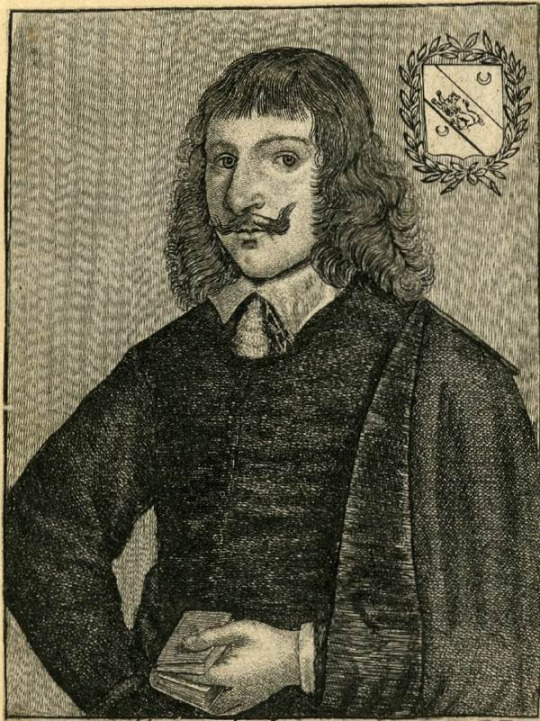
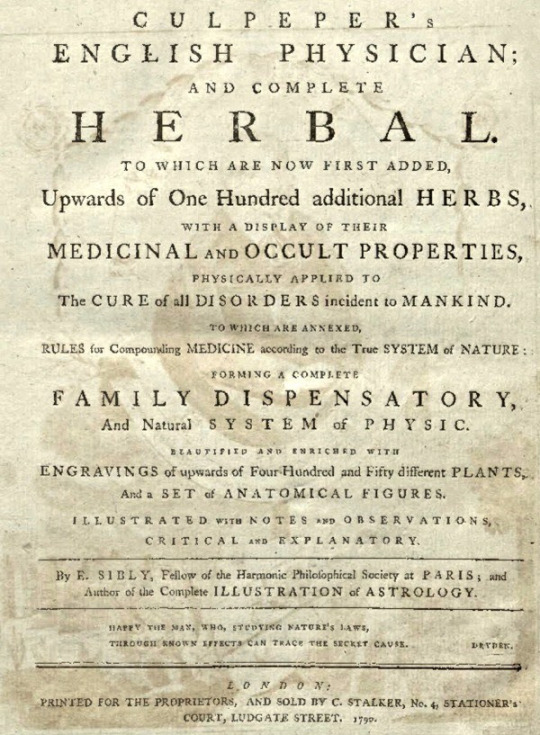

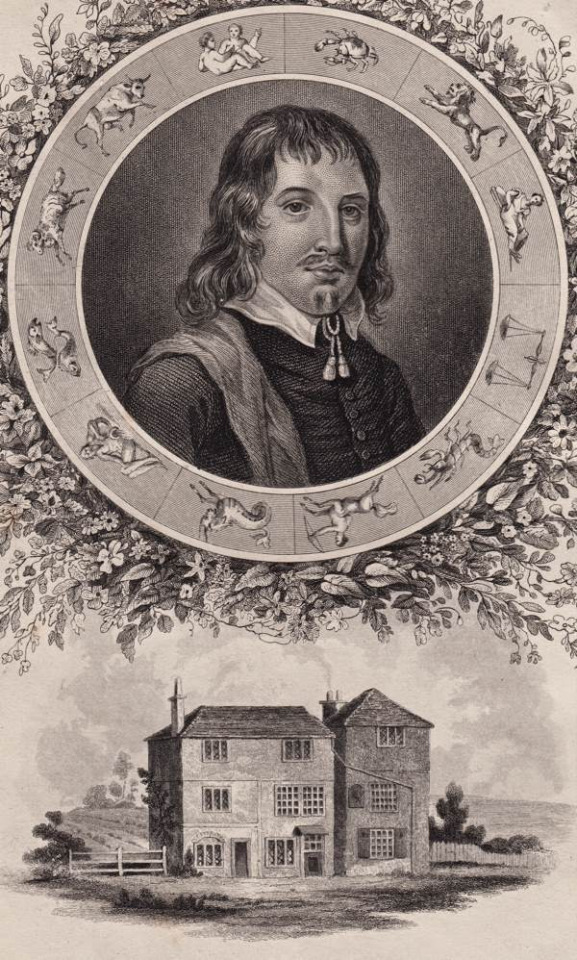
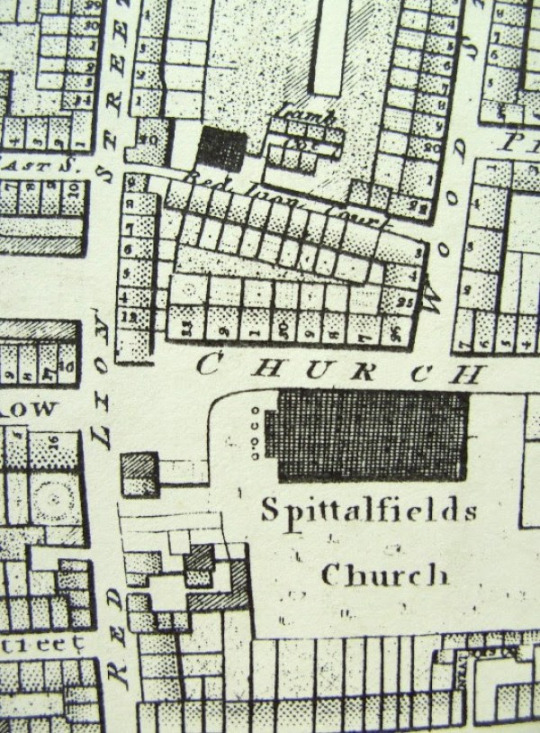

Spitalfieldslife blog post 2020-04-29. By the Gentle Author.
It is my pleasure to publish this profile of the famous herbalist of Spitalfields by Patricia Cleveland-Peck, gardener and writer.
Of all Spitalfields’ past residents, one name stands out above others – Nicholas Culpeper, born on October 18th 1616, a herbalist and medical practitioner operating from Red Lion St (now Commercial St) who devoted his life to healing, and especially to healing the poor.
While apprenticed to the apothecary Francis Drake of Bishopsgate, Nicholas accompanied Thomas Johnson (later editor of the 1633 edition of Gerard’s Herball) on plant hunting excursions. He loved herbs since boyhood and became expert at their identification, essential in those days when almost all ailments were treated with plants. Herbals served as handbooks for doctors in which each plant was named together with its ‘virtues’ or uses. Nicholas’ skill in this subject, coupled with the fact that he was very caring, meant that the people of Spitalfields flocked to him – sometimes as many as forty a morning – and they commonly received treatment for little or no payment.
This was not popular among Nicholas Culpeper’s qualified medical colleagues who were infuriated by his view that, “no man deserved to starve to pay an insulting, insolent physician.” He also believed in “English herbs for English bodies,” and went out gathering his own herbs from the countryside for free which did not endear him to the apothecaries who often insisted on expensive imported exotic plants for their ‘cures’.
In those days, there were strict divisions between what university-educated physicians, apothecaries and barber-surgeons (who drew teeth and let blood) were allowed to do. Physicians were expensive, so for most sick people the first port of call would be their own herb garden or still room, the second the ‘wise woman’ down the road, the third a visit to the apothecary – after which, for many, there was no other option but to let the illness run its course.
In 1649, Nicholas inflamed the establishment by producing an English translation of their latin ‘bible’ the Pharmacopoeia Londinensis which included all the recipes for their medicines. Published as A Physical Directory, it not only revealed the secret ingredients but gave instructions on how to administer them – one of his most important contributions, as it provided the first effective self-help book to which people could turn.
Even more galling for the medical fraternity was the fact Nicholas had never completed his apprenticeship, and chose Spitalfields to set up a semi-legal practice because it was outside the City of London and thus not governed by the rules of the College of Physicians. Spitalfields in those days was quite different from today, beyond the site of huge priory of St Mary Spital stretched the farmland of Spital Field. The priory had been dissolved under Henry VIII although parts of the precincts were still inhabited, and it was an area which attracted outsiders like Nicholas who, as well as treating his patients, was something of a political radical. In his pamphlets, he railed against the king, priests and lawyers as well as physicians. Consequently he was no stranger to controversy and at one point was even accused of witchcraft – just one of the many troubles which accumulated to beset him during his life.
The first of these even occurred thirteen days before his life began, for it was then that his father died leaving his mother without support. She and the new-born Nicholas were obliged to return to the protection of her father, William Attersole, vicar of the little village of Isfield in Sussex. Attersole was not happy about this arrangement but, although he did not welcome the child, he did see it as his religious duty to provide instruction for him as he grew. Young Nicholas learned the scriptures and the classics, he studied mathematics and, under his grandfather’s guidance, began to take an interest in astrology which later featured in his own works. He even stole a book on anatomy out of the library (where he was only supposed to read the bible) and read it in a barn.
Importantly, he also spent a lot of time with his mother who we know owned a copy of Gerard’s Herball. She was responsible for the health of the household and, from his later works, we can glean the fact that he soon became familiar with all the local Sussex ��simples’ or wild herbs. We know only little of this period of his life, but it is thought that he went to school in Lewes before – at the age of sixteen – setting off for Cambridge ostensibly to follow in his grandfather’s footsteps by studying theology. Once there, he began to attended lectures on anatomy and, perhaps frustrated that he couldn’t change to medicine, he spent most of his time smoking, drinking and socialising in taverns.
Yet the reason for his dropping out is a sad one. Young though he was, before leaving Sussex, Nicholas had fallen in love with Judith Rivers, a local heiress. She reciprocated his love and thus, knowing her family would never consent to the relationship, they planned to elope. They were to meet near Lewes and marry secretly, but on the way Judith’s coach was struck by lightning and she was killed. Nicholas was devastated and spent months sunk in melancholy. There was no question of his returning to Cambridge to study medicine or anything else. Eventually he chose to come to London and become an apothecary. Socially, this was a step down but he enjoyed his time at Bishopsgate and became very proficient.
Nicholas was twenty-four when he found love again. Called to treat a Mr Field for gouty arthritis, his eyes fell upon the fifteen-year-old daughter of the house, Alice. By a stroke of good fortune, she too was an heiress and it was her considerable dowry which enabled Nicholas to build a house in Red Lion St, Spitalfields from which he conducted his practice.
When the Civil War broke out two years later, the anti-royalist Nicholas signed up with Cromwell. Once his profession was discovered however, the recruiting offer commented, “We do not need you at the battlefield…come along as the field surgeon since most of the barbers and physicians are royal asses and we have use for someone to look after our injured.” Later, during the battle of Reading, Nicholas himself was wounded.
On his return to Spitalfields, he devoted himself to study and writing, and produced a number of books including a Directory for Midwives. Nicholas recognised that this was an unusual topic for a male herbalist, writing in the dedication, “If you (the matron) by your experiences find anything not according to the truth ( for I am a man and therefore subject to failings) first judge charitably of me…” Having grown up so close to his mother, Nicholas had a deep respect of women but this book may also have been inspired by some painful experiences in his own family for, although Alice bore him seven children, only one daughter lived to adulthood.
In 1652, Nicholas published his master work The English Physician also known as Culpeper’s Herbal which became the standard work for three hundred years and is still in print. It was sold cheaply and made its way to America where it had a lasting impact too. By 1665, ten years after his death, Nicholas’ name was so well-known that the Lord Mayor of London chose to use it alongside that of Sir Walter Raleigh in a pamphlet about avoiding infection from the Great Plague.
Nicholas Culpeper deserves to be remembered. He was always on the side of the underdog, he opposed the ‘closed shop’ of earlier physicians and he promoted sensible self-help. He also tried to offer reasonable explanations for what he wrote – “Neither Gerard nor Parkinson or any that ever wrote in a like manner ever gave one wise reason for what they wrote and so did nothing else but train up young novices in Physic in the School of Tradition, and teach them just as a parrot is taught… But in mine you see a reason for everything that is written.”
He died in 1654, aged only thirty-eight, of tuberculosis and is believed to be buried beneath Liverpool St Station.
Images:
1. Nicholas Culpeper (1616-1654)
2.Title page of the 1790 edition of Culpeper’s English Physician & Complete Herbal, published by C.Stalker, 4 Stationer’s Court, Ludgate St.
3. A Plate from the edition published by Richard Evans, 8 White’s Row, Spitalfields, August 12th, 1814.
4.Red Lion House, Nicholas Culpeper’s home in Spitafields. Becoming the Red Lion Tavern after his death, the building was demolished in the eighteen-forties as part of road widening when Commercial St was cut through to carry traffic from the docks.
5.“Culpeper’s house, of which there are woodcuts extant, it is of wood, and is situated the corner of Red Lion Court and Red Lion Street, Spitalfields. It is now and has long been a public house, known by the sign of the Red Lion, but at the time it was inhabited by the sage herbalist, it was independent of other buildings. While in the occupation of Culpeper, who died in 1654, this house stood in Red Lion Field and was as a dispensary of medicines (perhaps the first) of very considerable celebrity.” The European Magazine and London Review, January 1812. Red Lion St and Red Lion Court as shown on John Horwood’s map (1794-99) before Commercial St was cut through in the nineteenth century.
6. Plaque commemorating Nicholas Culpeper installed thanks to a campaign by Spitalfields Life
3 notes
·
View notes
Text
Ways to Find Best Hotels Near Liverpool Street Station
In the United Kingdom, Liverpool Street station earned great name and fame as the 3rd busiest station in the country. This popular railway station is also known as London Liverpool Street. It is the central London Railway terminus, and it establishes a connection with the northeastern corner of the nation. The railway terminus started its operation in the year 1874, replacing Bishopsgate station. This station has proximity to some of the popular areas of the UK and experiences massive footfall of customers every year and operated by Abellio Greater Anglia.
If you are planning to visit London soon and looking for the best and affordable hotels near Liverpool street station London, then you need to make a little effort to find the best one.
You can explore many areas in a hassle-free manner like Norwich, Ipswich; South end Victoria, Cambridge, etc. when you stay in any hotel in this location. Here you need to follow some essential points to get the best hotel. Just take a look at the below points.
Search online: Online search will let you know about famous as well as budgeted hotels to stay in Liverpool street station area. You will get the names and other information about reputed hotels from trusted classified sites or renowned hotel booking sites.
Check reviews: Reviews posted by the visitors of these hotels near Liverpool street station London will help you to find the best one for you. The real-time experience of the guests in hotels is perfect to offer you the exact pros and cons of the hotels making your selection easy.
Check accommodation facilities and cost: Before you finalize your booking, you must check the hotels' tariffs and accommodation options. If you are travelling with family, you need a family suite, and if you are alone on an official or a solo trip, then a single occupancy room will be best suited. So, check which hotels offer the rooms suiting your requirement and your budget.
The above are a few points you must consider when booking your accommodations with any of the renowned hotels in this location. Again, if any person known to you has already visited these hotels, you can ask them directly about them. Such references are beneficial for any traveller to the UK.
About the Author:
Crown Group of Hotels have been in the hospitality industry for over 20 years. They have comfortable, affordable hotels within London (the capital of the UK), which provide for all customer needs during their jam-packed trips to the capital. All hotels are located close to national and local train stations as well as business venues and prominent tourist attractions. All their hotels are of a good standard and are regularly renovated to ensure they retain their standards. They combine the old with the new exceptionally well, so each of their customers receives the modern comforts they are used to whilst also feeling like they are a part of this historic city.
1 note
·
View note
Link
We went to see Detective Pikachu tonight. Somehow I had entirely failed to realise that it was filmed in London, until I went to see it. Then as a Londoner, I couldn’t fail to see London. The Gherkin, and the Leadenhall building are present in many shots, hiding behind CGI skyscrapers. The CNM offices are actually in the Leadenhall building.
The scene where Snorlax is asleep in the road is in Bishopsgate by Liverpool Street station, with a very visible Transport for London bus stop and an almost invisible Pret a Manger. There’s a number 42 double-decker bus and a London black cab, along with British street signs.
Many of the brick buildings are clearly in Shoreditch. I barely ever go to East London, but the building styles in Shoreditch, Hoxton and Clerkenwell are very distinctive. They’re all former industrial areas which have “gentrified”, and are now good places to get overpriced soya lattes, beard trims, and fixee bicycle repairs.
I saw several London street signs which failed to be painted out, though you can barely see them, while a Lloyds Bank is visible on screen for long enough that I wondered if they’d actually sponsored the movie. The final scene of the movie takes place at Cannon Street station.
Did this affect my enjoyment of the movie? Actually, no. It enhanced it. The whole point of Detective Pikachu being a live-action movie is to help you imagine what it would be like to live in the Pokemon world. Thus it was profoundly meaningful to me that it was set in a futuristic version of the city I know best.
26 notes
·
View notes
Text



Exterior view of Columbia Market and dwellings in Bethnal Green c1880.
This general market that would later become a fish market, was commissioned by philanthropist Baroness Burdett-Coutts at a cost of £200,000 (a lot of money then) in 1869, and built in the then popular grand gothic style. The building was demolished in 1958.
Angela Burdett was born in 1814, grandaughter of Thomas Coutts, one of the two brothers who founded Coutts Bank. On the death of Thomas’s wife, an endowment of two million pounds went to the young Angela. She was now England’s wealthiest woman and the recipient of numerous offers of marriage. But although the young heiress would throw lavish parties at her Highgate estate, Holly Lodge, at which Queen Victoria and Charles Dickens were among the guests, her main interest was philanthropy. Pausing only to change her name to ‘Burdett-Coutts’ (which required a Royal Licence), she set about doing good.
Angela who by now was taking an active role in running the family business, saw the problem for East Enders of getting fresh food. London markets had to pay tolls, forcing up the price of the goods. In 1864, she donated £200,000 for the building of Columbia Market in Bethnal Green, which would both provide jobs for local people and supply affordable and nutritious produce. It was a huge Victorian Gothic master piece with room for 400 stalls, shops around the outside, and flats above the shops to house the traders. The new market replaced an older collection of street stalls, but the ambitious project never made money. It was relaunched as a fish market, with cheap fish coming in from the then-thriving east coast ports. That plan, though, depended on a new railway line coming out of Bishopsgate station (another white elephant that never really found its feet), but planning objections saw the new line shelved. In 1886, Columbia Market shut for good.
After the market closed, the market buildings were used as warehouses and small workshops. Prompted by her philanthropy, Angela Burdett-Coutts also built the separate U-shaped Columbia Dwellings, of several storeys, with a three-storey Gothic arch built into the brickwork of the central section. Neglect over the years and damage sustained in the blitz ment the buildings needed a lot of attention. The building was demolished in 1958, although the remains of railings can be seen in front of the present Nursery School.
Sivill House and the Dorset Estate later replaced the Coutts buildings.
32 notes
·
View notes
Text
Liverpool Street Station London Architecture
Liverpool Street Station Redevelopment, London Railway Architecture Photos, Location, Renewal, Images
Liverpool Street Station Building Photos
Railway Building in London, England, UK
1 April 2022
Design: Herzog & de Meuron, Architects, Basel
Herzog & de Meuron working on Liverpool Street Station Redevelopment
photo © Adrian Welch
Liverpool Street Station Building Redevelopment
The first names of companies working on a massive plan to redevelop Liverpool Street Station are beginning to emerge as Swiss architect Herzog & de Meuron plans a block up to 20 storeys high above part of the concourse, according to Building Design.
The Shard tower developer Sellar speaks to Network Rail about the job, codenamed Project Mersey, which will create more than a million square feet of mixed-use space at the site and revamp the country’s third-busiest station with new entrances on the south side. end. It also includes the construction of a new two-level concourse designed to reduce overcrowding at the station.
photo © Adrian Welch
In a so-called transparency statement published last December, Network Rail said: “The station has significant overcrowding problems. Current conditions at the station are expected to deteriorate as a result of projected growth in passenger numbers and transfer points.”
The message said the total cost to complete the job would be around £1.55 billion.
photo © Adrian Welch
The planned works include a new office building above the station, while the existing Andaz hotel at the station will be renovated.
The plan isn’t expected to go into schedule until at least the end of the year, but contractors are already on high alert for the job, which is estimated to have a construction cost of at least between £500m and £600m.
Sellar, which is working with Mace on the £350 million development of Paddington Square designed by Renzo Piano, is expected to tender for the contract next year, making it one of the most contentious construction contracts in recent years.
“There are some really big plans out there and this is one of them,” said a source.
photo © Adrian Welch
Sellar has development rights over the Andaz hotel, while Network Rail owns the Victorian 50 Liverpool Street building, which was to be demolished to improve access to the station.
Network Rail has previously said it will close a deal with the Sellar JV, which also includes Hong Kong-based carrier MTR, by January next year.
Others who would be working on the deal include cost consultant G&T and engineer WSP. Sellar has formed a joint venture for the work called Mersey 1 Ltd.
12 Nov 2012
Liverpool Street Station Building
New photo of southern entry facade, from 12 November 2012:
photo © Adrian Welch
Address: Liverpool St, London EC2M 7QH
Phone: 0845 711 4141
Opened: 1874
New office buildings to north of – and over – Liverpool Street Station:
photographs © Nick Weall
This railway station, also known as London Liverpool Street, is a central London railway terminus and connected London Underground station in the north-eastern corner of the City of London. It is the terminus for the West Anglia Main Line to Cambridge, the busier Great Eastern Main Line to Norwich, local and regional commuter trains serving east London and the East of England, and the Stansted Express to London Stansted Airport.
It was opened in 1874 as a replacement for the Great Eastern Railway’s main London terminus, Bishopsgate station, which was subsequently converted into a goods yard. This major London rail hub was built as a dual-level station with an underground station opened in 1875 for the Metropolitan Railway, named Bishopsgate until 1909 when it was renamed Liverpool Street. An additional station called Bishopsgate (Low Level) existed on the mainline just outside of the railway station from 1872 until 1916.
photos © Adrian Welch
During the First World War this street was a target of one of the most deadly daylight air raids by fixed-wing aircraft; the attack killed 162 people. In the build-up to the Second World War the station served as the terminus for thousands of child refugees arriving in London as part of the Kindertransport rescue mission.
The station was modernised and rationalised between 1985 and 1992; at the same time the neighbouring Broad Street station was demolished and its lines redirected to Liverpool Street. As part of the project the Broadgate development was constructed on the Broad Street site. Queen Elizabeth II officially opened the modified station in December 1991. Source: wikipedia
Building Redevelopment, Bishopsgate, City of London Dates built: 1985-91 Architects: British Rail – Architecture & Design Group
This railway hub building was refurbished in the late eighties.
Phone: +44 345 711 4141
Location: Liverpool St, London, EC2M 7PY, England, UK
London Station Buildings
Contemporary London Railway Station Building Designs
Eldon St adjacent to Liverpool St Station images © Nick Weall
Building photographs by Adrian Welch taken with Panasonic DMC-FX01 lumix camera; Leica lense: 2816×2112 pixels – original photos available upon request: info(at)e-architect.com
Euston Station
London Bridge Station
Kings Cross Station
UK Capital City Architecture
London Architecture Links – chronological list
London Architecture Tours by e-architect
London Architects Offices
The Scalpel Design: Kohn Pederson Fox – KPF image courtesy of the architects The Scalpel City of London Skyscraper
Bishopsgate Tower Bishopsgate Tower
London Architecture
Bishopsgate buildings context
60 Aldgate, Minories, City of London Design: ACME, Architects image courtesy of architects practice 60 Aldgate Building News
Comments / photos for the Liverpool Street Station Photos page welcome
The post Liverpool Street Station London Architecture appeared first on e-architect.
0 notes
Text
Backyard.
Scottsdale, an area which possesses a land area of much more than 180 situated actually in the heart of the State of Arizona, was actually combined in 1951. Aeneas beyond contacted us to his cronies, appearing in the direction of Deiphobus, Paris, and also Agenor, who were forerunners of the Trojans alongside themself, and the people followed all of them as lambs observe the ram when they decrease to drink after they have been actually feeding, and also the soul of the shepherd is glad-even therefore was actually the soul of Aeneas brightened when he observed his people observe him. Due to the fact that also on your quite worst times - also on your best days - this area is going to whack you in the deal with affection. After the battle, as the Communists took energy, my daddy got away to London, where he analyzed at the London Institution of Business economics just before embarking on what eventually ended up being an extremely productive career in financing. Guests additionally take pleasure in the Hearthstone Historic Property Gallery, twojepiekno18.Info which was the nation's 1st hydroelectric central power plant. Martin Braun, 76, of New York Urban area stopped utilizing his raucous machine as well as unpleasant disguise, today he is actually attempting once more after an auto accident when he dropped off to sleep at the wheel.
When the New York Condition Militia was called in, order was lastly recovered. Simply 8 individuals were actually stated killed along with concerning a hundred hurt (both body matters may reasonably be actually thought as downplayed, lower than what may be counted on). When he superimposed a urban center on a waste of timbered, snow-covered standard, he based to begin with the gold-strike that created the city achievable, and next he possessed an eye for boat touchdowns, sawmill as well as storage facility places, and all the demands of a far-northern exploration urban area.

. Just before deciding on any kind of institution, you have to go via analyses to discover what users have to condition about the business's solutions and time administration Zurich airport terminal Livigno company organization that market value consumers will not get late for work, and also it'll regularly see to it that their cars are actually readily available when you wish all of them. An episode of Legionnaires ailment in New York has actually killed seven folks and afflicted 86 others, as the metropolitan area relocated Tuesday to formulate brand new regulation to stop future episodes. Participating in an organised Venice walking scenic tour will certainly enable you to experience the great tasting hidden techniques of the city that a lot of individuals skip in their thrill to check off the primary touristic destinations. In the reduced photo, drawn from outside the Bishopsgate doorway to Liverpool Road Station, the entire of Bishopsgate made use of to appreciate the early morning sunshine on its own western edge. It had been a number of years desire of the artist themself, as well as his loved ones, that he needs to have a visibility in his birth place metropolitan area of Málaga.

Below the author shared his experience as well as some insight while taking a trip with a personal ride cars and truck in Mumbai. Greater london is a remarkable metropolitan area, and also I enjoyed my break certainly there, as well as checked out several locations. Consequently, Wilfrid adhered to the mentor of Christ themself, as he initially supplied people of the Meon Lowland and afterwards went on to inform all of them all about The lord's passion as well as goodness. It continues to amaze me that on the times you simply require a little bit of an opportunity break God tosses urban area development your technique. My beloved time to head to the City is actually quickly after X-mas when shopping crowds are finished, and you may still appreciate the stunning lightings at night and the Christmas time show at Radio Area Music Hall.
0 notes
Text
The Exodus From London
So you understand the roaring wave of fear that swept through the greatest city in the world just as Monday was dawning--the stream of flight rising swiftly to a torrent, lashing in a foaming tumult round the railway stations, banked up into a horrible struggle about the shipping in the Thames, and hurrying by every available channel northward and eastward. By ten o'clock the police organisation, and by midday even the railway organisations, were losing coherency, losing shape and efficiency, guttering, softening, running at last in that swift liquefaction of the social body.
All the railway lines north of the Thames and the SouthEastern people at Cannon Street had been warned by midnight on Sunday, and trains were being filled. People were fighting savagely for standing-room in the carriages even at two o'clock. By three, people were being trampled and crushed even in Bishopsgate Street, a couple of hundred yards or more from Liverpool Street station; revolvers were fired, people stabbed, and the policemen who had been sent to direct the traffic, exhausted and infuriated, were breaking the heads of the people they were called out to protect.
And as the day advanced and the engine drivers and stokers refused to return to London, the pressure of the flight drove the people in an ever-thickening multitude away from the stations and along the northward-running roads. By midday a Martian had been seen at Barnes, and a cloud of slowly sinking black vapour drove along the Thames and across the flats of Lambeth, cutting off all escape over the bridges in its sluggish advance. Another bank drove over Ealing, and surrounded a little island of survivors on Castle Hill, alive, but unable to escape.
After a fruitless struggle to get aboard a North-Western train at Chalk Farm--the engines of the trains that had loaded in the goods yard there PLOUGHED through shrieking people, and a dozen stalwart men fought to keep the crowd from crushing the driver against his furnace--my brother emerged upon the Chalk Farm road, dodged across through a hurrying swarm of vehicles, and had the luck to be foremost in the sack of a cycle shop. The front tire of the machine he got was punctured in dragging it through the window, but he got up and off, notwithstanding, with no further injury than a cut wrist. The steep foot of Haverstock Hill was impassable owing to several overturned horses, and my brother struck into Belsize Road.
So he got out of the fury of the panic, and, skirting the Edgware Road, reached Edgware about seven, fasting and wearied, but well ahead of the crowd. Along the road people were standing in the roadway, curious, wondering. He was passed by a number of cyclists, some horsemen, and two motor cars. A mile from Edgware the rim of the wheel broke, and the machine became unridable. He left it by the roadside and trudged through the village. There were shops half opened in the main street of the place, and people crowded on the pavement and in the doorways and windows, staring astonished at this extraordinary procession of fugitives that was beginning. He succeeded in getting some food at an inn.
For a time he remained in Edgware not knowing what next to do. The flying people increased in number. Many of them, like my brother, seemed inclined to loiter in the place. There was no fresh news of the invaders from Mars.
At that time the road was crowded, but as yet far from congested. Most of the fugitives at that hour were mounted on cycles, but there were soon motor cars, hansom cabs, and carriages hurrying along, and the dust hung in heavy clouds along the road to St. Albans.
It was perhaps a vague idea of making his way to Chelmsford, where some friends of his lived, that at last induced my brother to strike into a quiet lane running eastward. Presently he came upon a stile, and, crossing it, followed a footpath northeastward. He passed near several farmhouses and some little places whose names he did not learn. He saw few fugitives until, in a grass lane towards High Barnet, he happened upon two ladies who became his fellow travellers. He came upon them just in time to save them.
He heard their screams, and, hurrying round the corner, saw a couple of men struggling to drag them out of the little pony-chaise in which they had been driving, while a third with difficulty held the frightened pony's head. One of the ladies, a short woman dressed in white, was simply screaming; the other, a dark, slender figure, slashed at the man who gripped her arm with a whip she held in her disengaged hand.
My brother immediately grasped the situation, shouted, and hurried towards the struggle. One of the men desisted and turned towards him, and my brother, realising from his antagonist's face that a fight was unavoidable, and being an expert boxer, went into him forthwith and sent him down against the wheel of the chaise.
It was no time for pugilistic chivalry and my brother laid him quiet with a kick, and gripped the collar of the man who pulled at the slender lady's arm. He heard the clatter of hoofs, the whip stung across his face, a third antagonist struck him between the eyes, and the man he held wrenched himself free and made off down the lane in the direction from which he had come.
Partly stunned, he found himself facing the man who had held the horse's head, and became aware of the chaise receding from him down the lane, swaying from side to side, and with the women in it looking back. The man before him, a burly rough, tried to close, and he stopped him with a blow in the face. Then, realising that he was deserted, he dodged round and made off down the lane after the chaise, with the sturdy man close behind him, and the fugitive, who had turned now, following remotely.
Suddenly he stumbled and fell; his immediate pursuer went headlong, and he rose to his feet to find himself with a couple of antagonists again. He would have had little chance against them had not the slender lady very pluckily pulled up and returned to his help. It seems she had had a revolver all this time, but it had been under the seat when she and her companion were attacked. She fired at six yards' distance, narrowly missing my brother. The less courageous of the robbers made off, and his companion followed him, cursing his cowardice. They both stopped in sight down the lane, where the third man lay insensible.
"Take this!" said the slender lady, and she gave my brother her revolver.
"Go back to the chaise," said my brother, wiping the blood from his split lip.
She turned without a word--they were both panting--and they went back to where the lady in white struggled to hold back the frightened pony.
The robbers had evidently had enough of it. When my brother looked again they were retreating.
"I'll sit here," said my brother, "if I may"; and he got upon the empty front seat. The lady looked over her shoulder.
"Give me the reins," she said, and laid the whip along the pony's side. In another moment a bend in the road hid the three men from my brother's eyes.
So, quite unexpectedly, my brother found himself, panting, with a cut mouth, a bruised jaw, and bloodstained knuckles, driving along an unknown lane with these two women.
He learned they were the wife and the younger sister of a surgeon living at Stanmore, who had come in the small hours from a dangerous case at Pinner, and heard at some railway station on his way of the Martian advance. He had hurried home, roused the women--their servant had left them two days before--packed some provisions, put his revolver under the seat--luckily for my brother--and told them to drive on to Edgware, with the idea of getting a train there. He stopped behind to tell the neighbours. He would overtake them, he said, at about half past four in the morning, and now it was nearly nine and they had seen nothing of him. They could not stop in Edgware because of the growing traffic through the place, and so they had come into this side lane.
That was the story they told my brother in fragments when presently they stopped again, nearer to New Barnet. He promised to stay with them, at least until they could determine what to do, or until the missing man arrived, and professed to be an expert shot with the revolver--a weapon strange to him--in order to give them confidence.
They made a sort of encampment by the wayside, and the pony became happy in the hedge. He told them of his own escape out of London, and all that he knew of these Martians and their ways. The sun crept higher in the sky, and after a time their talk died out and gave place to an uneasy state of anticipation. Several wayfarers came along the lane, and of these my brother gathered such news as he could. Every broken answer he had deepened his impression of the great disaster that had come on humanity, deepened his persuasion of the immediate necessity for prosecuting this flight. He urged the matter upon them.
"We have money," said the slender woman, and hesitated.
Her eyes met my brother's, and her hesitation ended.
"So have I," said my brother.
She explained that they had as much as thirty pounds in gold, besides a five-pound note, and suggested that with that they might get upon a train at St. Albans or New Barnet. My brother thought that was hopeless, seeing the fury of the Londoners to crowd upon the trains, and broached his own idea of striking across Essex towards Harwich and thence escaping from the country altogether.
Mrs. Elphinstone--that was the name of the woman in white--would listen to no reasoning, and kept calling upon "George"; but her sister-in-law was astonishingly quiet and deliberate, and at last agreed to my brother's suggestion. So, designing to cross the Great North Road, they went on towards Barnet, my brother leading the pony to save it as much as possible. As the sun crept up the sky the day became excessively hot, and under foot a thick, whitish sand grew burning and blinding, so that they travelled only very slowly. The hedges were grey with dust. And as they advanced towards Barnet a tumultuous murmuring grew stronger.
They began to meet more people. For the most part these were staring before them, murmuring indistinct questions, jaded, haggard, unclean. One man in evening dress passed them on foot, his eyes on the ground. They heard his voice, and, looking back at him, saw one hand clutched in his hair and the other beating invisible things. His paroxysm of rage over, he went on his way without once looking back.
As my brother's party went on towards the crossroads to the south of Barnet they saw a woman approaching the road across some fields on their left, carrying a child and with two other children; and then passed a man in dirty black, with a thick stick in one hand and a small portmanteau in the other. Then round the corner of the lane, from between the villas that guarded it at its confluence with the high road, came a little cart drawn by a sweating black pony and driven by a sallow youth in a bowler hat, grey with dust. There were three girls, East End factory girls, and a couple of little children crowded in the cart.
"This'll tike us rahnd Edgware?" asked the driver, wild-eyed, white-faced; and when my brother told him it would if he turned to the left, he whipped up at once without the formality of thanks.
My brother noticed a pale grey smoke or haze rising among the houses in front of them, and veiling the white facade of a terrace beyond the road that appeared between the backs of the villas. Mrs. Elphinstone suddenly cried out at a number of tongues of smoky red flame leaping up above the houses in front of them against the hot, blue sky. The tumultuous noise resolved itself now into the disorderly mingling of many voices, the gride of many wheels, the creaking of waggons, and the staccato of hoofs. The lane came round sharply not fifty yards from the crossroads.
"Good heavens!" cried Mrs. Elphinstone. "What is this you are driving us into?"
My brother stopped.
For the main road was a boiling stream of people, a torrent of human beings rushing northward, one pressing on another. A great bank of dust, white and luminous in the blaze of the sun, made everything within twenty feet of the ground grey and indistinct and was perpetually renewed by the hurrying feet of a dense crowd of horses and of men and women on foot, and by the wheels of vehicles of every description. "Way!" my brother heard voices crying. "Make way!"
It was like riding into the smoke of a fire to approach the meeting point of the lane and road; the crowd roared like a fire, and the dust was hot and pungent. And, indeed, a little way up the road a villa was burning and sending rolling masses of black smoke across the road to add to the confusion. Two men came past them. Then a dirty woman, carrying a heavy bundle and weeping. A lost retriever dog, with hanging tongue, circled dubiously round them, scared and wretched, and fled at my brother's threat.
So much as they could see of the road Londonward between the houses to the right was a tumultuous stream of dirty, hurrying people, pent in between the villas on either side; the black heads, the crowded forms, grew into distinctness as they rushed towards the corner, hurried past, and merged their individuality again in a receding multitude that was swallowed up at last in a cloud of dust.
"Go on! Go on!" cried the voices. "Way! Way!"
One man's hands pressed on the back of another. My brother stood at the pony's head. Irresistibly attracted, he advanced slowly, pace by pace, down the lane.
Edgware had been a scene of confusion, Chalk Farm a riotous tumult, but this was a whole population in movement. It is hard to imagine that host. It had no character of its own. The figures poured out past the corner, and receded with their backs to the group in the lane. Along the margin came those who were on foot threatened by the wheels, stumbling in the ditches, blundering into one another.
The carts and carriages crowded close upon one another, making little way for those swifter and more impatient vehicles that darted forward every now and then when an opportunity showed itself of doing so, sending the people scattering against the fences and gates of the villas.
"Push on!" was the cry. "Push on! They are coming!"
In one cart stood a blind man in the uniform of the Salvation Army, gesticulating with his crooked fingers and bawling, "Eternity! Eternity!" His voice was hoarse and very loud so that my brother could hear him long after he was lost to sight in the dust. Some of the people who crowded in the carts whipped stupidly at their horses and quarrelled with other drivers; some sat motionless, staring at nothing with miserable eyes; some gnawed their hands with thirst, or lay prostrate in the bottoms of their conveyances. The horses" bits were covered with foam, their eyes bloodshot.
There were cabs, carriages, shop cars, waggons, beyond counting; a mail cart, a road-cleaner's cart marked "Vestry of St. Pancras," a huge timber waggon crowded with roughs. A brewer's dray rumbled by with its two near wheels splashed with fresh blood.
"Clear the way!" cried the voices. "Clear the way!"
"Eter-nity! Eter-nity!" came echoing down the road.
There were sad, haggard women tramping by, well dressed, with children that cried and stumbled, their dainty clothes smothered in dust, their weary faces smeared with tears. With many of these came men, sometimes helpful, sometimes lowering and savage. Fighting side by side with them pushed some weary street outcast in faded black rags, wide-eyed, loud-voiced, and foul-mouthed. There were sturdy workmen thrusting their way along, wretched, unkempt men, clothed like clerks or shopmen, struggling spasmodically; a wounded soldier my brother noticed, men dressed in the clothes of railway porters, one wretched creature in a nightshirt with a coat thrown over it.
But varied as its composition was, certain things all that host had in common. There were fear and pain on their faces, and fear behind them. A tumult up the road, a quarrel for a place in a waggon, sent the whole host of them quickening their pace; even a man so scared and broken that his knees bent under him was galvanised for a moment into renewed activity. The heat and dust had already been at work upon this multitude. Their skins were dry, their lips black and cracked. They were all thirsty, weary, and footsore. And amid the various cries one heard disputes, reproaches, groans of weariness and fatigue; the voices of most of them were hoarse and weak. Through it all ran a refrain:
"Way! Way! The Martians are coming!"
Few stopped and came aside from that flood. The lane opened slantingly into the main road with a narrow opening, and had a delusive appearance of coming from the direction of London. Yet a kind of eddy of people drove into its mouth; weaklings elbowed out of the stream, who for the most part rested but a moment before plunging into it again. A little way down the lane, with two friends bending over him, lay a man with a bare leg, wrapped about with bloody rags. He was a lucky man to have friends.
A little old man, with a grey military moustache and a filthy black frock coat, limped out and sat down beside the trap, removed his boot--his sock was blood-stained--shook out a pebble, and hobbled on again; and then a little girl of eight or nine, all alone, threw herself under the hedge close by my brother, weeping.
"I can't go on! I can't go on!"
My brother woke from his torpor of astonishment and lifted her up, speaking gently to her, and carried her to Miss Elphin-stone. So soon as my brother touched her she became quite still, as if frightened.
"Ellen!" shrieked a woman in the crowd, with tears in her voice--"Ellen!" And the child suddenly darted away from my brother, crying "Mother!"
"They are coming," said a man on horseback, riding past along the lane.
"Out of the way, there!" bawled a coachman, towering high; and my brother saw a closed carriage turning into the lane.
The people crushed back on one another to avoid the horse. My brother pushed the pony and chaise back into the hedge, and the man drove by and stopped at the turn of the way. It was a carriage, with a pole for a pair of horses, but only one was in the traces. My brother saw dimly through the dust that two men lifted out something on a white stretcher and put it gently on the grass beneath the privet hedge.
One of the men came running to my brother.
"Where is there any water?" he said. "He is dying fast, and very thirsty. It is Lord Garrick."
"Lord Garrick!" said my brother; "the Chief Justice?"
"The water?" he said.
"There may be a tap," said my brother, "in some of the houses. We have no water. I dare not leave my people."
The man pushed against the crowd towards the gate of the corner house.
"Go on!" said the people, thrusting at him. "They are coming! Go on!"
Then my brother's attention was distracted by a bearded, eagle-faced man lugging a small handbag, which split even as my brother's eyes rested on it and disgorged a mass of sovereigns that seemed to break up into separate coins as it struck the ground. They rolled hither and thither among the struggling feet of men and horses. The man stopped and looked stupidly at the heap, and the shaft of a cab struck his shoulder and sent him reeling. He gave a shriek and dodged back, and a cartwheel shaved him narrowly.
"Way!" cried the men all about him. "Make way!"
So soon as the cab had passed, he flung himself, with both hands open, upon the heap of coins, and began thrusting handfuls in his pocket. A horse rose close upon him, and in another moment, half rising, he had been borne down under the horse's hoofs.
"Stop!" screamed my brother, and pushing a woman out of his way, tried to clutch the bit of the horse.
Before he could get to it, he heard a scream under the wheels, and saw through the dust the rim passing over the poor wretch's back. The driver of the cart slashed his whip at my brother, who ran round behind the cart. The multitudinous shouting confused his ears. The man was writhing in the dust among his scattered money, unable to rise, for the wheel had broken his back, and his lower limbs lay limp and dead. My brother stood up and yelled at the next driver, and a man on a black horse came to his assistance.
"Get him out of the road," said he; and, clutching the man's collar with his free hand, my brother lugged him sideways. But he still clutched after his money, and regarded my brother fiercely, hammering at his arm with a handful of gold. "Go on! Go on!" shouted angry voices behind.
"Way! Way!"
There was a smash as the pole of a carriage crashed into the cart that the man on horseback stopped. My brother looked up, and the man with the gold twisted his head round and bit the wrist that held his collar. There was a concussion, and the black horse came staggering sideways, and the carthorse pushed beside it. A hoof missed my brother's foot by a hair's breadth. He released his grip on the fallen man and jumped back. He saw anger change to terror on the face of the poor wretch on the ground, and in a moment he was hidden and my brother was borne backward and carried past the entrance of the lane, and had to fight hard in the torrent to recover it.
He saw Miss Elphinstone covering her eyes, and a little child, with all a child's want of sympathetic imagination, staring with dilated eyes at a dusty something that lay black and still, ground and crushed under the rolling wheels. "Let us go back!" he shouted, and began turning the pony round. "We cannot cross this--hell," he said and they went back a hundred yards the way they had come, until the fighting crowd was hidden. As they passed the bend in the lane my brother saw the face of the dying man in the ditch under the privet, deadly white and drawn, and shining with perspiration. The two women sat silent, crouching in their seat and shivering.
Then beyond the bend my brother stopped again. Miss Elphinstone was white and pale, and her sister-in-law sat weeping, too wretched even to call upon "George." My brother was horrified and perplexed. So soon as they had retreated he realised how urgent and unavoidable it was to attempt this crossing. He turned to Miss Elphinstone, suddenly resolute.
"We must go that way," he said, and led the pony round again.
For the second time that day this girl proved her quality. To force their way into the torrent of people, my brother plunged into the traffic and held back a cab horse, while she drove the pony across its head. A waggon locked wheels for a moment and ripped a long splinter from the chaise. In another moment they were caught and swept forward by the stream. My brother, with the cabman's whip marks red across his face and hands, scrambled into the chaise and took the reins from her.
"Point the revolver at the man behind," he said, giving it to her, "if he presses us too hard. No!--point it at his horse."
Then he began to look out for a chance of edging to the right across the road. But once in the stream he seemed to lose volition, to become a part of that dusty rout. They swept through Chipping Barnet with the torrent; they were nearly a mile beyond the centre of the town before they had fought across to the opposite side of the way. It was din and confusion indescribable; but in and beyond the town the road forks repeatedly, and this to some extent relieved the stress.
They struck eastward through Hadley, and there on either side of the road, and at another place farther on they came upon a great multitude of people drinking at the stream, some fighting to come at the water. And farther on, from a lull near East Barnet, they saw two trains running slowly one after the other without signal or order--trains swarming with people, with men even among the coals behind the engines--going northward along the Great Northern Railway. My brother supposes they must have filled outside London, for at that time the furious terror of the people had rendered the central termini impossible.
Near this place they halted for the rest of the afternoon, for the violence of the day had already utterly exhausted all three of them. They began to suffer the beginnings of hunger; the night was cold, and none of them dared to sleep. And in the evening many people came hurrying along the road nearby their stopping place, fleeing from unknown dangers before them, and going in the direction from which my brother had come.
1 note
·
View note
Text
#1 The Faerie Ring - REVIEW
Book Series: The Faerie Ring
Author: Kiki Hamilton
Rating: 4.0 stars
Publication Date: September 27th 2011
Number of pages: hardcover, 343 pages
Synopsis: The year is 1871...
Tiki has been making a home for herself and her family of orphans in a deserted hideaway adjoining Charing Cross Station in central London. Their only means of survival is by picking pockets. One December night, Tiki steals a ring, and sets off a chain of events that could lead to all-out war with the Fey. For the ring is a reservoir that holds a truce between the English royals and the world of the Fey. But there are many who want the ring, including the mysterious Rieker, a handsome pickpocket who has been watching Tiki, and a rebel group of UnSeelie fey who would do anything to break the truce...
A delicious blend of urban fantasy and heart-stopping suspense, the story of THE FAERIE RING takes you from the gritty slums of London to the glittering ballrooms of the Royal Palace to the menacing Otherworld - in a spellbinding tale of mystery and suspense where nothing is what it seems...

You like stories of a gang of orphan mischiefs in the center of London? You want to read about the Victorian Era and the likes of Prince Arthur and Leopold? You have a fascination for folk stories full of faeries and monsters? Kiki Hamilton manages to incorporate it all in an amazing, breathtaking adventure.
The plot unveils harmoniously, the dialogue flows nicely and the characters always seem to hide a little bit more than what we already know. Although I wouldn't call it a mystery novel, it sure has it's secrets laced nicely with the action of the narrative. Reading the book felt like a dialogue with a faerie if I could dare say so myself. You read through the chapters and when you are close enough to figure out one of it's mysteries something else catches your eyes and you find yourself following another trail - in the end you find yourself surprised by all the mysteries you had already solved along the way but completely forgot about them. Just as a dialogue with a faerie can take you on many paths only to realize afterwards how you have been deceived by her choice of words.
The most fascinating character was obviously Rieker who so happens to speak the first line of the book: "You wouldn't be here pickin' pockets, would you?". From the first scene we gather that he has a soft spot for our female protagonist, Tiki, or a plan to take advantage of her pickpocketing talent. We all know you're not supposed to trust the 'king of thieves' in a town like London, and although that is not his title, he was known around the streets and Stories about him stretched from Bishopsgate in the East End, to Charing Cross in the heart of the city, all the way to the King's Cross here in the North End. It's clear he knows how to read, he has some sort of connection to the faeries and he seems to know too much about too many things. In other words, he's a dangerous guy and Tiki had always been weary of him and known not to trust him.
Of course, thinks get tangled when he seems to know she had stolen the Queen's ring and clearly knows more about her birthmark on her hand than she does. I'm not gonna lie to you guys, I started liking this guy from my second page on Kindle: "Maybe you're followin' me." He looked her up and down with a mocking gaze. "Because I'd swear I've never seen your pretty face in here before." Tiki forced an insincere smile. "Maybe you weren't looking hard enough."
Tiki is a 16 years old thief with a heart of gold. She dresses as a boy and rums the street hoping to find enough money for food for her new 'family': Shamus, Fiona, Toots and Clara, a group of orphans that tries to survive their harsh life. Tiki had been born in a good family, she knows how to read and speak in an articulate manner but after her parents' death she ends up in the street and is rescued by Shamus and Fiona. Later on she finds Toots - who at 9 years old was thrown out of his home because his mother had too many mouths to feed - and Clara - a sick 4 years old girl left for dead. She's a smart girl who loves her family with all she's got and between stealing the next meal, she teaches the kids how to read and dreams of a warm home for them where they could all be a family.
Her character is well written but I don't think she's one of my favorite female heroes - at least not yet. Truth be told this is the first book in a series of four and although I've just read about 300 pages about this world it feels like I barely grasped anything. The real adventure is about to begin and I'm thrilled and terrified at the prospect. At the end of the first installment their lives are drastically changed and it's clear the next book will have a different setting. We barely met any faeries, we still don't know much about Tiki's birthmark but I just know that the next books will take us to different worlds and I can't wait to read more about it.
I recommend this books to all fantasy lovers and I don't really know how you could be disappointed. Just of course, if you read the story for the romantic part - it's not bad, it's just not..much. It was perfect for this story and it had its importance but it wasn't a really big deal. The guy liked the girl for a while before anything really happened between them, so it wasn't rushed or written poorly it just isn't the main focus of the story; but it is beautiful written and I totally ship those two.
#the faerie ring series#kiki hamilton#tiki#fiona#toots#clara#shamus#rieker#wills#prince leo#prince arthur#queen victoria#victorian era#london#fantasy book#faeries#book review#book quotes#tiki x rieker
1 note
·
View note
Text
Always a personal pleasure to be back in the capital running a new parkrun event for me that has a great history attached to it with today’s event being no exception at Bethlem Royal Hospital, Beckenham.
History
The history of Bethlem Royal Hospital dates back to its foundation in 1247 in the reign of Henry VIII and was originally located in the Bishopsgate ward of the City of London that is now is the site of Liverpool Street Station.
In 1930 the hospital moved to Beckenham where it is today based in 270 acres of beautiful green space parkland that’s where today’s parkrun event is based!
For the record the hospital remit is to help as they state “We provide the widest range of services in the United Kingdom (UK) for people with mental health problems or an addiction to drugs or alcohol.”
Pioneers
It was great to see Bethlem Royal Hospital as a pioneer for being the first parkrun in the UK to be run inside NHS grounds. I cannot hide my admiration of this hospital trust to promote their goal of the benefits of running to one’s mental health and wellbeing, allowing parkrun into your beautiful grounds after I found this out when a spoke to Mary this weeks tail walker who works at the hospital!
This has to be one of the most heartwarming stories that I have ever written about on my parkrun journeys!
Special Mentions
I need to say how proud I was in running at the same event as Kevin Burnett he may have been a first timer at Bethlem, but he still running strong in his eighties with only has 6 parkrun events left to run from reaching the outstanding milestone total of completing 500 parkrun events!
Kevin you are a true legend and ambassador to us all and this is why we all love parkrun so much sir!
Also a pleasure to bump Andy Bond who I first met at Southwark parkrun back in July 2016 near the start of my capital charity parkrun adventure!
He had a brilliant run, then barcode scanned afterwards and I would like to wish you Andy all the best in your future running sir!
Votes Cast
A bit of fun over the past week I decided to let me tourist friends decide for one time only vote on which parkrun to run on Saturday between Bethlem Royal Hospital and East Grinstead.
The result was close as you can see with Bethlem finishing as a narrow winner, but don’t worry East Grinstead I will run your course in the new year to complete the parkrun tourist challenge of joining the Compass Club 🙂
Course
The course is two anticlockwise laps of the parameter of two fields with a short narrow connecting woodland path between them with a short run down a path to the finish at the end of the second lap. The surface is entirely run on grass which is gently undulating in nature that as they say is also uneven in places!
East Field
West Field
Woodland path
East Field
Points to note
No dogs allowed on this course
In wet conditions it would be advisable to wear trail running shoes
When the ground is firm this can be a fast course to run with wide paths to overtake
Enjoyed my run with a good time achieved by me for where I am at the moment fitness wise 37:43
Facilites
There is limited parking available at the hospital Sat nav BR3 3BX, but I decided to travel by train from Luton with the closest station to the hospital being Eden Park station.
Please be aware though that Eden Park is easily is a good 10 min walk away from the start of the parkrun, so allow effort time to get to the start line!
For the post run coffee we retired to the hospital’s Community Centre Cafe and there are toilet facilities there as well, but please be aware they only take cash only payments for refreshments!
Final Verdict
I would like to thank this weeks run director Paul Cregg and his team of volunteers for making us all feel welcome and doing a great job! Good luck to Colette Short who will has her first stint as run director at Bethlem next week 🙂
Finally a very big thank you to everyone concerned at Bethlem Royal Hospital for opening up your lovely grounds to allow parkrun to hold an event here, absolutely brilliant guys!!!
So for me it is Londone again 56 Greater London parkrun events completed and everyone has a special place in my heart!
So London it is goodbye for now,
Best
Mark aka Silent Runner
Bethlem Royal Hospital Always a personal pleasure to be back in the capital running a new parkrun event for me that has a great history attached to it with today's event being no exception at…
0 notes
Text
London Climate Change Conference
An unusual sight: the Lloyd’s building in the sunshine
The D&O Diary was on assignment in London this past week, primarily to participate in an evens organized in connection with the Mayor of London’s Climate Action Week conference. It was a great week in London, primarily because of the conference, but also because of the unusually pleasant weather. It was also interesting being in London for the Fourth of July holiday.
The specific Climate Action Week event in which I participated was organized by the Clyde & Co law firm in collaboration with Willis Towers Watson. At the Clyde & Co Climate Change Liability Risk Conference, I was on a panel on the topic of “Fiduciary Duties, Climate Change Disclosures, and Litigation Risk.” It was a pleasure to be a part of this panel and to share ideas with the other panelists and with the audience. I think I learned as much or more as anyone there; it was a very interesting and even eye-opening event. The conference was well-organized and impressively well-attended (notwithstanding the absolutely beautiful weather outside). I congratulate everyone at Clyde & Co. and Willis involving in planning and organizing this successful event.
The Willis Towers Watson building, on the right and directly across from the Lloyd’s building, where the climate change event was held. In the back ground, you can see the Swiss Re building (the Gherkin).
With my fellow panelists: Will Martindale, of UN Principles for Responsible Investment; Nadine Robinson of the Climate Change Disclosure Standards Board; and Anthony Hobly of Carbon Tracker.
With Ellie Mulholland of Commonwealth Climate Law and Sarah Barker of Minter Ellison. Both Ellie and Sarah are readers of The D&O Diary. Sarah came all the way from Australia for the climate conference.
I also had the opportunity while I was in London to participate in or attend several other events and meetings. One of the other enjoyable events in which I participated was a morning session at RKH Specialty at which I discussed D&O claims trends. It was great to see all my friends at RKH Specialty and to exchange ideas and observations about the current D&O insurance marketplace. I thank my good friends Jason Rose and Piers Davies of RKH Specialty for inviting me to visit their offices and to meet with their team. It was a really enjoyable morning.
Making a presentation at RKH Specialty.
On the roof terrace of the RKH building, with Piers Davies and Jason Rose. You can see the Shard in the background and the Walkie-Talkie just above Jason’s left shoulder.
With John Taylor of Antares Managing Agency Limited, on the terrace of the Sushisamba Restaurant at 110 Bishopsgate (allegedly the highest outdoor dining terrace in Europe)
Though it was a busy week of meeting and events, I did also have a chance to spend a little time just enjoying London. As always when I am in London, I tried to spend my time visiting places and doing things I have not managed to do on prior visits. One of the more enjoyable things I managed to do on this trip was to witness the Changing of the Guard at Buckingham Palace. As many times I have been to London before, I had never previously seen the Changing of the Guard. It is a thoroughly made-for-tourists event. There is a lot of marching around and music playing. It isn’t always clear what is going on and regardless of where you stand it is impossible to see all of it. But it is quite a spectacle and on the beautiful morning on which we saw the event, it was a lot of fun.
As many times as I have been to London before, another thing I had not previously managed to do was to visiting the Banqueting House, which is the only remaining vestige of the once vast Whitehall Palace. Even with its really kind of dazzling Reubens ceiling, the Banqueting House is quite plain, even stark. However, because of the site’s remarkably eventful history, it is a fascinating place to visit. For anyone interested in English history it is a truly great place to visit. Perhaps because of the beautiful weather the day we visited, it was virtually deserted while we were there.
On a free day during our London week, we took a London Overground train to Chigwell and walked from the train station to Epping Forest, a vast former royal forest. Because the forest land has been never been farmed or developed, the deep woods are ancient and extraordinary. We pretty quickly became seriously lost, which brought to mind old legends and fairy tales about people who wandered into the forest and were never seen again. We actually saw only a small portion of the more than twelve-mile long forest but we managed to pretty thoroughly exhaust ourselves. After a couple of hours of wandering, we found a small tea hut, where we refreshed and reoriented ourselves before making our way to the train and back to London.
The forest enclosure also includes ancient meadows, where local residents retain the right to graze their animals
The vast forest stretches for over 12 miles; we explored only a small part of it
Most of my prior visits to London have been in the early spring or late fall. Typically, I am visiting London in March or November. It was really enjoyable to see London in the sunshine and to enjoy the late evenings when the daylight lingered on almost to 10 pm. London is always a great place to visit, but I have to say it is a really special place to visit in July. It was a shame to have to leave.
Evening at the village green in Richmond-Upon-Thames
More Pictures of London
Kew Palace, Kew Gardens
In the Japanese Gardens in Kew, with the famous Pagoda in the background and sculptures by the American glass sculptor Dale Chihuly in the foreground
In the rose garden at Kew
The Saatchi Gallery, near Sloan Square
Inside the strangely austere Saatchi Gallery
Queen Elizabeth’s Hunting Lodge in Epping Forest
The post London Climate Change Conference appeared first on The D&O Diary.
London Climate Change Conference published first on http://simonconsultancypage.tumblr.com/
0 notes
Text
London Climate Change Conference
An unusual sight: the Lloyd’s building in the sunshine
The D&O Diary was on assignment in London this past week, primarily to participate in an evens organized in connection with the Mayor of London’s Climate Action Week conference. It was a great week in London, primarily because of the conference, but also because of the unusually pleasant weather. It was also interesting being in London for the Fourth of July holiday.
The specific Climate Action Week event in which I participated was organized by the Clyde & Co law firm in collaboration with Willis Towers Watson. At the Clyde & Co Climate Change Liability Risk Conference, I was on a panel on the topic of “Fiduciary Duties, Climate Change Disclosures, and Litigation Risk.” It was a pleasure to be a part of this panel and to share ideas with the other panelists and with the audience. I think I learned as much or more as anyone there; it was a very interesting and even eye-opening event. The conference was well-organized and impressively well-attended (notwithstanding the absolutely beautiful weather outside). I congratulate everyone at Clyde & Co. and Willis involving in planning and organizing this successful event.
The Willis Towers Watson building, on the right and directly across from the Lloyd’s building, where the climate change event was held. In the back ground, you can see the Swiss Re building (the Gherkin).
With my fellow panelists: Will Martindale, of UN Principles for Responsible Investment; Nadine Robinson of the Climate Change Disclosure Standards Board; and Anthony Hobly of Carbon Tracker.
With Ellie Mulholland of Commonwealth Climate Law and Sarah Barker of Minter Ellison. Both Ellie and Sarah are readers of The D&O Diary. Sarah came all the way from Australia for the climate conference.
I also had the opportunity while I was in London to participate in or attend several other events and meetings. One of the other enjoyable events in which I participated was a morning session at RKH Specialty at which I discussed D&O claims trends. It was great to see all my friends at RKH Specialty and to exchange ideas and observations about the current D&O insurance marketplace. I thank my good friends Jason Rose and Piers Davies of RKH Specialty for inviting me to visit their offices and to meet with their team. It was a really enjoyable morning.
Making a presentation at RKH Specialty.
On the roof terrace of the RKH building, with Piers Davies and Jason Rose. You can see the Shard in the background and the Walkie-Talkie just above Jason’s left shoulder.
With John Taylor of Antares Managing Agency Limited, on the terrace of the Sushisamba Restaurant at 110 Bishopsgate (allegedly the highest outdoor dining terrace in Europe)
Though it was a busy week of meeting and events, I did also have a chance to spend a little time just enjoying London. As always when I am in London, I tried to spend my time visiting places and doing things I have not managed to do on prior visits. One of the more enjoyable things I managed to do on this trip was to witness the Changing of the Guard at Buckingham Palace. As many times I have been to London before, I had never previously seen the Changing of the Guard. It is a thoroughly made-for-tourists event. There is a lot of marching around and music playing. It isn’t always clear what is going on and regardless of where you stand it is impossible to see all of it. But it is quite a spectacle and on the beautiful morning on which we saw the event, it was a lot of fun.
As many times as I have been to London before, another thing I had not previously managed to do was to visiting the Banqueting House, which is the only remaining vestige of the once vast Whitehall Palace. Even with its really kind of dazzling Reubens ceiling, the Banqueting House is quite plain, even stark. However, because of the site’s remarkably eventful history, it is a fascinating place to visit. For anyone interested in English history it is a truly great place to visit. Perhaps because of the beautiful weather the day we visited, it was virtually deserted while we were there.
On a free day during our London week, we took a London Overground train to Chigwell and walked from the train station to Epping Forest, a vast former royal forest. Because the forest land has been never been farmed or developed, the deep woods are ancient and extraordinary. We pretty quickly became seriously lost, which brought to mind old legends and fairy tales about people who wandered into the forest and were never seen again. We actually saw only a small portion of the more than twelve-mile long forest but we managed to pretty thoroughly exhaust ourselves. After a couple of hours of wandering, we found a small tea hut, where we refreshed and reoriented ourselves before making our way to the train and back to London.
The forest enclosure also includes ancient meadows, where local residents retain the right to graze their animals
The vast forest stretches for over 12 miles; we explored only a small part of it
Most of my prior visits to London have been in the early spring or late fall. Typically, I am visiting London in March or November. It was really enjoyable to see London in the sunshine and to enjoy the late evenings when the daylight lingered on almost to 10 pm. London is always a great place to visit, but I have to say it is a really special place to visit in July. It was a shame to have to leave.
Evening at the village green in Richmond-Upon-Thames
More Pictures of London
Kew Palace, Kew Gardens
In the Japanese Gardens in Kew, with the famous Pagoda in the background and sculptures by the American glass sculptor Dale Chihuly in the foreground
In the rose garden at Kew
The Saatchi Gallery, near Sloan Square
Inside the strangely austere Saatchi Gallery
Queen Elizabeth’s Hunting Lodge in Epping Forest
The post London Climate Change Conference appeared first on The D&O Diary.
London Climate Change Conference published first on
0 notes